King Country







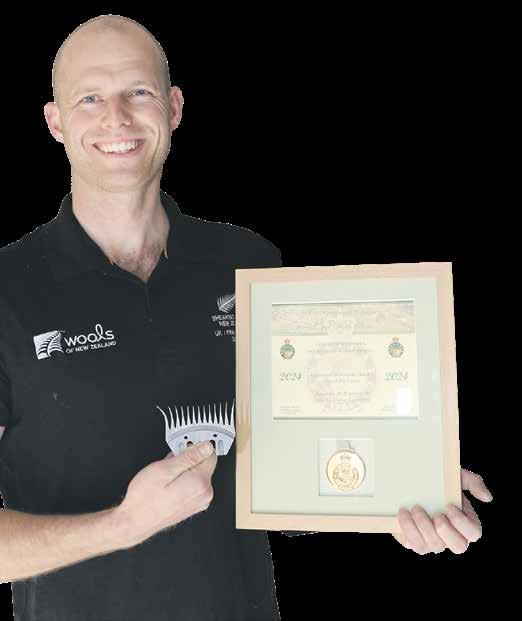
“The Welsh crowds are deafening. When there’s a good race between the Welsh and the Kiwis, it’s the best atmosphere on earth. Nowhere else is comparable. We have the Golden Shears and New Zealand Shears, but Kiwis are quite Anglo Saxon at times.“The Welsh are just mad on shearing. They absolutely love it. Te Kūiti is quite tame really compared to
The highlight for Fagan was winning the Great Yorkshire show in England where they sheared Swaledale sheep.
“They have got horns and they are really tricky to shear. I really enjoy the challenge of them and quite enjoy the British
“What’s unique about shearing in Europe is practically every competition that you do, you have got a different line of sheep and a different breed. It’s not like New Zealand where you are shearing cross breeds or second shear every weekend - so all of your combs are the same.
“Often you are using different combs in every competition in the UK. It’s all your own gear. It’s quite an art modifying the gear to suit the sheep. It takes year of experience to build up that comb collection, that range you have.”
Fagan and teammate David Buick, of Pongaroa, claimed test match wins at the Great Yorkshire Show, in France and the Royal Welsh Show. They also entered open shears and Jack won eight of the 11 he entered and was second once and third twice.
France was different and he appreciated the culture and the way the team was looked after.
“It was really special, all the commentary. French music played while you are shearing. It’s probably one of the most unique competitions you could do in the whole shearing calendar. A really cool event. Just because of the culture it makes it such a unique event,”
He spent eight seasons in France so did not have a problem with the language. And Welsh? “I know enough to make a few people smile when we are having a beer.”
• See Top drawer performance, page 15



By Paul Charman
An active King Country huntaway named Puzzle injured his carpal (wrist) joint at work and had to have ac plate put in.
But being very energetic, he broke the plate - and was facing either amputation, or a new plate. Neither of these two options were affordable for the famer who owned him. The farmer contacted Retired Working Dogs NZ, where staff decided Puzzle had plenty of life left in him.
“We decided to fund a new plate and raised money to pay for the surgery, which went ahead last month,” a spokesperson for the organisation, Marie-Claire Andrew said.
“But once the vet had a look he decided we didn’t have to replace the plate because it was healing very well; so it’s great we decided not to amputate.”
Puzzle had since spent 12 weeks in a foster home and the next step would be to place him in a new pet home, where he could lead a calmer life.
“Puzzles’ case is really typical of situations we deal with. These surgeries are expensive and its also a big commitment for a farmer to look after a dog and rehabilitate it for weeks. Every dollar counts on farm.”
• See Second time hound, Page 4.








127 Rora St, Te Kūiti 07 878 1011
By Paul Charman
The call has gone out for artists and musicians with a connection to Ōtorohanga to support the ArtBeat event in late November.
The collaboration between the ArtBeat team, Ōtorohanga Museum and Ōtorohanga Creative Conduit will run on November 23 and 24.
Lead organiser Rebecca Dowman-Ngāpō says the sky’s the limit when it comes to the range of arts to be featured.
championed by the late Māori broadcaster Derek Kōtuku Totorewa Wooster, of Ōtorohanga.
“Before passing away in 2022, Derek really showed us what was possible by organising the first ArtBeat. Then plans were interrupted by Covid and other setbacks, but now we feel the time is right to proceed,” Ngāpō said.
“I am going to approach schools in the district about staging dance and musical performances. They will also be offered space to set up stalls to sell baking to raise funds.”




Book your advertising space
janine@goodlocal.nz

News/Editorial
Roy Pilot editor@goodlocal.nz
027 450 0115
Andy Campbell andy@goodlocal.nz
021 0232 1666
Paul Charman paul@goodlocal.nz
027 405 9038
Sigrid Christiansen sigrid@goodlocal.nz
022 080 6141
Advertising Director
Janine Davy janine@goodlocal.nz 027 287 0005
Owner/Publisher David Mackenzie david@goodlocal.nz
07 878 1188 reception@goodlocal.nz
address, and telephone number. Opinions expressed are not necessarily those of the publishers.
The King Country News is published by Good Local Media Ltd
As well as musicians and dancers and poets, the event aims to encourage painters, sculptures, weavers, carvers, quilters and more to participate.
“We’ve really just got to put the word out and see who responds.”
The two-day festival is a revival of the ArtBeat event created in 2020-21 which was
The public would participate in group artworks. One would involve painting tiles to create a collaborative mural and another pages for a “zine” (home made magazine) titled, “What Makes Your Heart Sing”.
Each person would be encouraged to create a page to be bound into a booklet.”
“The plan is to set up mini exhibitions
The Waitomo Caves choir will host its first open day for this year, on the morning of Saturday August 31 at Ōtorohanga Baptist church.
Everyone’s welcome. But to make up the needed balance of voices, blokes especially are sought; particularly those with tenor voices, the comparatively high part of the male vocal spectrum.
“Men love the companionship in the choir. They enjoy the banter that goes on in the group. We have a lot of laughs and support each other. Someone always has a story,” Waitomo Music Society president Katrin Woermer said.
“We don’t need the same number of each voice (from high to low – soprano, alto, tenor and bass) but we do need some.
That’s not to say the lowest male voices, in the bass range, aren’t important: another of the choir’s resident experts, Beth Dalton, calls them “the plate on which the rest of the cake sits.”
The choir, usually 25-40 singers strong, is made up entirely of community volunteers.
It’s a unique project mixing the Caves, this area’s most popular international tourism destination, with the art of choral singing –and all its camaraderie.
“Come along first and make up your mind later. It’s totally obligation free, just a chance to learn more about what we do, enjoy singing, and learn about it for the morning,” she said.
It isn’t expected that everyone arrives already possessing these skills, because techniques are taught.

Every Friday
Heartland Services Building, 71 Rora Street, Te Kuiti
If you have a concern that you would like to talk to me about please contact my office to make an appointment.
Email Kuriger.kingcountry@parliament.govt.nz or phone 021 832734 to schedule an appointment to see us

“There’s a range of abilities and levels of experience. Commitment is needed, because we want to put on a good performance.”
Members range in age from teenagers to older people, so no one need feel they won’t fit in.
Woermer said the choir was a source of personal wellbeing.
“Even if I have arrived at a rehearsal feeling tired, that two hours of singing and breathing well means that afterwards, I feel energised, awake and refreshed.”
“Some people do yoga and others meditate, and singing has similar health benefits.”
They rehearse on Thursday nights, but only for a few months. While most community choirs practice all through the year, the Caves Choir doesn’t: for them, it’s just September, October and November.
There will also be weekend retreat at Marokopa, known as the “camplet” in late October.
The Caves concerts will be on December 6,7 and 8; tickets will be on sale at Waitomo I-site from November 25.
One of the choir’s biggest supporters is THL, Tourism Holdings Ltd, which allow for the choir to use its stunning venue, the “cathedral” in the Glowworm Cave as well as providing staff to usher visitors into the caves.
THL provide all the security and logistics around getting in and out of the caves.
Permission to actually be in the caves comes from the Caves Management Committee which includes DOC and the owners of the cave, the Ruapuha Uekaha Hapu Trust.
“The choir is non auditioned, however, to retain a good balance of voices, new membership is limited,” Katrin said.
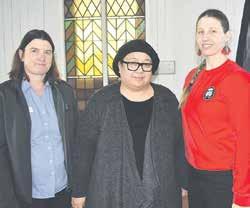
from local schools and artists in participating shop windows as well, then create a link to encourage people to come to the museum and have a look around.
“ArtBeat is about the creative heartbeat of our community.
“Above all, ArtBeat will celebrate our district’s creatives; those who often work isolated in their studios at home. Here’s an opportunity for them to come out and show the community what they do behind closed doors and what they have to offer.”
In your great article ‘Kirton’s petition to stop the rot’, the Department of Conservation admitted that its legal wrangle with the previous holder of the lease to run the Chateau, KAH International, is ongoing.
The building has been empty and deteriorating since it closed on February 5, 2023 – and the legal wrangles over end of lease matters are ongoing?
Really? This is unacceptable, at so many levels. It tells us precisely nothing. Who/when/ how will this matter be progressed let alone resolved? This is a genuine question for DOC that requires a meaningful set of answers.
The Chateau is shut up and DOC admits it is not weather tight and that they cannot guarantee furnishings etc inside will not deteriorate. But they have been locked in a legal dispute for two years with the previous lease holder and little if anything has been done to get the building up and running. To me, even if it was put on Trademe for $1, that could well create a better outcome than this impasse You gotta love bureaucracy.
Sam Clarkson Whakapapa



By Andy Campbell
Waikato Water Done Well is three waters under another name, with the fangs pulled.
That’s the gist of the workshops presented to King Country councils this week.
Waikato Water Done Well will be voluntary, councils will be able to opt in, opt out as it suits. But as was touted with Three Waters, there will be strength in numbers, and better financial outcomes for ratepayers.
Presenting were Matamata-Piako chief executive Don McLeod, former Three Waters Entity B chief Vaughan Payne, and Co-Lab chief Kelvin French.
“There are some facts, some realities that need to be talked about irrespective of what direction you believe might be appropriate for Ōtorohanga,” McLeod said.
The various Waikato councils’ long term plans revealed the amount of capital works scheduled in the Waikato over the next 10 years is valued at $5 billion dollars.
There isn’t a contracting industry able to deliver, and with supply constrained demand goes up and so do prices. Aggregation can give individual district councils more opportunity to influence than they can alone.
“Nobody is going to listen to Matamata-Piako if I go to the

regional council and say I want to spread the work out,” McLeod said.
But there was an opportunity for catchment-based consenting as opposed to consenting every individual plant.
He said not every council would benefit to same degree financially, but if councils considered the work opportunities, if they gave
consideration to what could be achieved by aggregating, that would substantiate more of a case to think about those possibilities.
Vaughan Payne said councils were expected to deliver water services plans and financial models to the government.
The plans are required next year and must describe the delivery for
each council and what investment will be made to deliver on regulatory requirements.
The other component was the model - individual or in combination with other councils.
Councils can set up their own council controlled organisations (CCOs) or do so with other councils.
Continued on page 3
By Paul Charman
The Bank of New Zealand won’t say if a Te Kūiti woman scammed out of thousands of dollar will get her money back.
The News revealed last week the woman, described by police as elderly, fell victim to a hoax caller and gave out details of her account thinking she was talking to a bank staff member.
The thief took $48,000 from her account.
Though the woman has not been identified, the bank has declined to say whether or not she would see her money again – unless she signed a privacy waiver.
The bank spokesperson said scammers posing as employees of banks or other financial institutions now regularly aimed to get personal information, banking credentials, or money from people.
Our sister paper, the Te Awamutu News, reported through its weekly columnist Community
Constable Ryan Fleming this week that there had been several scams targeting users of the Facebook marketplace site in the last week.
The BNZ spokesperson said bank account scammers would send “urgent-sounding messages” or make calls, often purportedly from the bank’s ‘fraud’ department, to create a sense of panic and prompt immediate action.
“They are often variations of “your bank account has been accessed”, or “a payment has been made from your account. If this was not you, call us urgently on xxx”, the spokesperson said.
Police said in the Te Kūiti case the woman was contacted in an early evening call by a scammer posing as a BNZ employee.
The scammer persuaded her to link her with one of her BNZ bank accounts, from which the money was then withdrawn.
The BNZ spokesperson said such scams could be convincing, but there were some key things
people could do to keep themselves safe, including: Don’t click on links or open attachments sent by someone you don’t know or seem out of character for someone you do know. Hover your mouse over links to reveal the actual site.
If it doesn’t seem right, hang up and contact your bank immediately on the number on their official website, or the number on the back of your card.
Urgency is a red flag – scammers will try to rush you.
Banks will never ask for your bank account details, password or pin number, nor will they send you a text message with a link asking you to log in.
Contact your bank as soon as possible if you think you’ve been scammed.
Keep your computer and phone security software up to date.
Trust your gut – if it feels wrong, it probably is.
Ōtorohanga police are hoping the flush out the culprit or culprits who stole a cistern from a public toilet block last week.
Sergeant Jimmie Walker said the door leading to a toilet near netball courts on Alex Telfer Drive in Ōtorohanga was forced open to get access to the cistern, which is valued at about $500. Walker described the incident on Thursday night or Friday morning as “very odd”.
The damage to a cubicle most people use to spend a penny was estimated $100.
A man suffered serious injuries and was flown to Waikato Hospital for treatment after a rope became entangled in the rotor blades of a helicopter at Marokopa on Tuesday.
It is understood the incident happened as the helicopter was on the ground being prepped for fertiliser spreading at about 10am at a property on Mangatoa Rd.
The motor was running when a rope connected to a bucket mounted on a nearby truck became entangled in the main rotor blades.
Fire crews from Te Kūiti and Piopio made the hour and 20-minutes-drive to the scene after a call at 10.03am.
“The bucket was dislodged off the truck and damaged the helicopter, injuring one person,” Te Kūiti fire chief Hayden Sheedy said.
Brigade members secured the scene and ensured no fuel had leaked from the helicopter. It is understood the injured man was working as part of the helicopter’s ground crew. He was taken to Waikato Hospital by the Taranaki Air Ambulance helicopter.

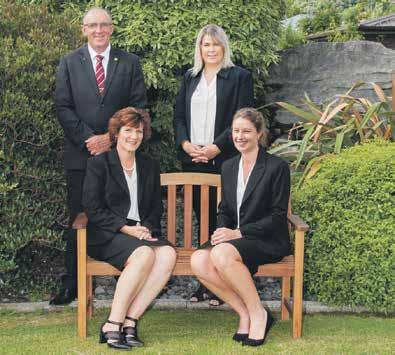




Some working dogs must retire due to age or injuries. Some just never were cut out for farm life. Paul Charman reports on what happens next.
Retired Working Dogs was founded more than 10 years ago to foster and to help rehome retired or injured farm dogs.
It also finds homes for working breeds not suited to farm life.
With more than 40 dogs to rehome, the charity works with about 500 farmers a year to rehome working dogs on their behalf.
There is no cost to the farmer.
Trustee Marie-Claire Andrews said high onfarm costs had resulted in an increase in the number of dogs in need of new homes.
But why do working dogs have to retire?
“Some of the younger ones do so because, just like people, they are not cut out for the job,” she says.
“There may be no room for them on farm, where there are only a certain amount of kennels and work must get done. Farmers need active, committed tools to get the job done. So we’ll rehome those younger ones.
“Some of the mid-life ones have to retire after injuries. So we get them off farm to rehabilitate them and give them lives as pets. And them some are just too old to work anymore.
“I have adopted a pig dog named Eric, who was pretty much exhausted following 10 years of holding those pigs down. He’s the best pet I could imagine. We live in a tiny house, where he is totally relaxed, and he just fits himself in there perfectly.”
What sort of home does Retired Working Dogs look for?
“It depends on the dog as every dog is different,” says Andrews.
“The older dogs don’t need a massive amount of exercise so town houses are fine, as long as they can get out on the grass and meet other dogs and be socialised.
“Some of our dogs would still like to do a bit of work so lifestyle blocks are great, where there’s maybe a couple of sheep or cows to move around. If it just keeps them entertained and engaged that’s great.
“Some dogs are happy to be left alone as they are used to being crated, while others really do like the company of other humans or other dogs. People who work from home can be a really good fit.
“We match our applicants to our dogs very carefully to make sure it’s going to work out,” she says.
The adoption process begins with a visit to the Retired Working Dogs website where people can read about some of the dogs available and fill out an application.
A team of volunteers then reviews the application and may put the farmer directly in touch with the applicant.
If the dog has been placed in foster care to transition to a new home the volunteers arrange a meet and greet. This way the dog can go to the environment and meet other dogs if they are there.
The prospective new owner can then see for themselves how the dog relates to children, cats, and other animals. A month’s trail follows, after which the Retired Working Dogs trust will take the dog back if things don’t work out.
“But mostly the month’s trial is successful













By Paul Charman
More King Country readers are downloading electronic books and other media using apps provided by their library.
When The News checked with district councils, Ōtorohanga and Ruapehu shared their numbers to illustrate the increase in popularity.
Ōtorohanga Library manager Heather Taylor said the biggest leap in demand followed lifting of restrictions placed on people during Covid in 2020.
“Since then, it has been growing incrementally and hasn’t slowed down. Pre-Covid the number of eBooks, audio-books, e-Videos and e-Movies borrowed was just over 1500; last year for the same areas it was 3250.
The movies available tended to be more highbrow films, classics, documentaries, TV shows or art house. But the core of demand was for eBooks and audio books which could be played on a mobile phone.
What were the advantages?
“I can absolutely speak for myself and say when I am travelling, I’ll load my absolute limit of eBooks and audio books onto my phone.
“So, I only have to pack one device, rather than trying to pack 10 books if I’m going away for a week or so. The other good thing if you’re travelling is playing the audio books in the car while you drive. If you’re not a music person you may like a story to keep you

Heather Taylor with flyers promoting the Libby app, which supplies eBooks.
company. You don’t have to worry about the radio tuning in and out.
Just push play and enjoy.
“I also use them when I am out gardening or doing housework.
“As well as being great for


•
those with poor eyesight, if you are dyslexic or have a learning disability, you can change the font and page colour to suit what works for you. This is important as dyslexia affects 20 per cent of the







population and represents 80–90 percent of all those with learning disabilities.”
By grouping with other libraries
Ōtorohanga had provided a larger range of eBooks.
“We’re not just relying on what we can afford to buy because we are in consortia comprising bigger libraries with more money to spend. We’re able to get more bang for our buck for our customers.
Ōtorohanga is grouped with Rotorua, Tauranga, Waitomo, Hauraki and others.”
There had also been a substantial uptick in eBook consumption in the Ruapehu District.
Library manager Fiona Thomas said just after Covid, in the year 2021-2022 5500 eBooks went out, while in the last year it had been almost 10,500.
“So, demand has almost doubled in the last two years which is quite significant.
Ruapehu also had a wide selection thanks to being in a lower North Island consortium of libraries.
“We’re with about 10 other libraries who can all pitch in toward covering the costs involved.”
EBooks had been an enormous boon to those who lived a long way from their library.
“As long as they have internet access they can download what they want.”
“You can either listen to an audio book or enlarge the point size of the text on an eBook. This is great for older readers. We tend to assume eBooks as something for the young but so many older people value them and have gone to the effort of learning how to use them.”



By Paul Charman
Ruapehu Mayor Weston
Kirton says regulation could be needed to save the Winstone Pulp Mill near Ohakune, which has closed due to soaring electricity prices.
The largest employer in the Ruapehu District closed indefinitely earlier this month with owners saying electricity prices rendered it uneconomic.
Kirton said the cost of electricity, “which has surged by 600 per cent” over the past couple of years, was jeopardising operations.
“In September 2021, a megawatt hour cost $100, it now stands at $700. Despite
significant investments in new equipment and a 30 per cent reduction in electricity use to boost productivity, the Winstone mill is now up against the wall.’”
He said permanent closure of the mill – which employs almost 300 people - would be a devastating blow, not only to the local and regional economy but also to New Zealand’s already limited value-added manufacturing base.
But the plight of the Winstone mill was not unusual – industrial sites all over the country were now in jeopardy, he added.
“In a country where most of our electricity is produced from renewable resources,




mainly rain, this situation is unacceptable and highlights systemic and policy failures.
Kirton supported Regional Development Minister Shane Jones’ call for a substantive inquiry into electricity pricing to push down prices.
“As Minister Jones pointed out, New Zealand has recently experienced the highest electricity costs in the western world, and we cannot allow our businesses to be destroyed by this.”
He called on the government to regulate the market, saying the importance of the Winstone mill to the central North Island was comparable that of Tiwai Aluminium smelter to Southland.”
Jones has accused New Zealand’s four big power companies of profiteering.
Those in electricity generation and retail – the so-called gentailers - are dominated by Meridian, Contact, Genesis and Mercury.
“There are provisions under the existing electricity legislation that enable the Crown to use a code of conduct which has legal force to change their behaviour,” he said.
“For a long time I’ve felt there were some significant


deficiencies in the structural makeup of our wholesale energy market.”
Jones said the government was examining shortterm measures to remedy failings in the rules and the regulations governing the energy market.
Victoria University economist Geoff Bertram supports Jones’ point of view.
“The market is doing exactly what it was set up to do, which is to get high prices and high profits at times of scarcity,” Bertram said.
“If it were a competitive
market then you could run some economic theory to say well that might be OK, but it’s not a competitive market, this is a market where scarcity goes straight through to profiteering.”

By Chris Gardner
A Ngati Apakura backed initiative to get an old Kihkihi pub operating as a community hub has taken another step forward.
Te Pukenga student To’o.
“I love it. I so see myself working in the community. This is more me.”
For University of Waikato nursing student Muhammad Hussain, the visit was all about learning in the field.
“All together, it’s quite good,” he said.


A free clinic – which will run each week –is one of the most tangible examples of the vision Bill Harris and his team had when they negotiated to use the disused 150-year-old Alpha Hotel owned by Auckland businessman and former politician Arthur Anae.









Last week Pixie Stockman walked smiling from a health and wellbeing assessment in the old hotel building. She consulted Te Kotahi Oranga Health and Wellness Centre student nurse Natasha To’o during the studentassisted clinic’s first visit to the Alpha.
“I felt I had a real personal touch and was not being shooed out of the door like I would be at the GPs,” said the 57-year-old Kihikihi woman who works in Te Awamutu.
Waipā Māori ward councillor Dale-Maree Morgan was among the dozen visitors who consulted the team. Rural communities like Kihikihi often found it difficult to access even basic healthcare, she said.
Te Kotahi Oranga manager Jacqui CoatesHarris - a registered nurse mentor - said the health and wellness centre offered free pre-diabetes care and management among its services alongside a falls assessment and prevention programme.











Stockman will ask for her prescribed medication to be reviewed following her consultation.
“Pixie just came in for a free check-up, and we were able to measure her vital signs,” said
Harris, Ngāti Apakura Runanga Trust chair, said it was satisfying to see the community hub being used to help the community.
“GP costs are going up, people are not going to come,” he said.
“If we can make a difference, that’s the purpose.”
A series of avalanches on ski field –including Turoa – has prompted a warning from the Mountain Safety Council to skiers and snowboarders to adopt “backcountry precautions” when leaving a patrolled ski area.
“These incidents really highlight that all slopes beyond ski field boundaries, no matter how close, should be regarded as backcountry terrain and treated accordingly,” chief executive Mike Daisley said. “Fortunately, in these cases, no one was injured, despite several close calls.”
On Saturday, the Turoa ski patrol on Mt Ruapehu reported signs of an avalanche outside the ski area. It prompted a search operation because it
was not known if anyone was in the area at the time.
Debris was searched using avalanche transcievers and then the local search and rescue dogs avalanche team.
The search concluded with no one found.
“Skiing within the ski field boundary means you’re within a controlled environment where ski patrols monitor and manage avalanche danger,” Daisley said. In contrast, skiing in the backcountry is an uncontrolled, wild environment, where avalanche hazards are not actively managed.
“Those venturing beyond the patrolled ski area boundaries need to take responsibility for assessing the terrain, understanding snow conditions and making safe decisions.”
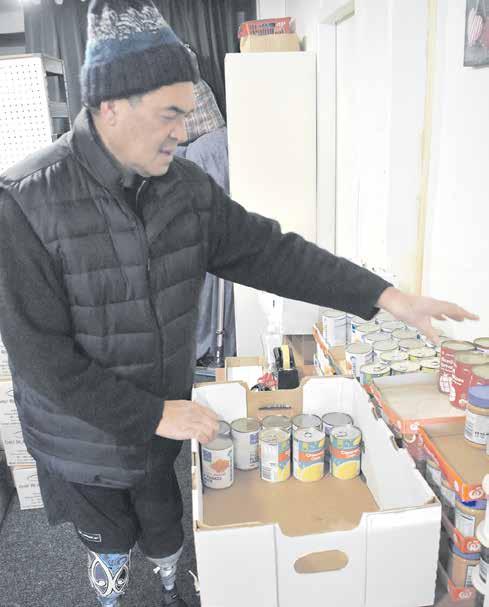
By Paul Charman
Despite reports of people sleeping in cars at Te Kūiti, food bank demand has been relatively quiet in recent weeks.
Food bank managers say they have been getting as few as one or two inquiries a week but have heard of needs in the community going unmet.
“The other day we came across two people living in their car who wanted blankets, but we didn’t have any,” Te Kūiti Korowai Aroha Food Bank chair Shane Mangioni-Ashby said.
Those sleeping in cars at Te Kūiti were usually from other centres, having come from Hamilton or Auckland where it was more difficult to park in public places at night.
However, lack of food was not confined to rough sleepers.
“We have had businesspeople come to the shop and tell us they are desperately struggling, but they have been too shy to reach out for help. We have to look after them as well because they keep the community going. If our businesses close, we’ll be a ghost town.”
Meanwhile, reduced midweek demand at the Te Kūiti Foodbank run from Journey
The North King Country Development Trust is hosting a one-day Finance Essentials workshop specifically for board members from local community-based organisations.
Learn about financial information and processes essential for all Directors. Course covers practical applications on understanding financial terminology, reporting, obligations and how to recognise red flags!
Register now to boost your boardroom capabilities!
Wednesday, 9th October 2024
Les Munro Centre, Te Kūiti
Discounted Fee – 80% of the overall cost ($1,250) is sponsored by NKCDT 20% ($250 per person) contributed by attendee
Church, has seen it change opening times from three to two days a week.
Journey pastor Terry Bradley said days of opening were now Friday and Monday from 11am to 1pm and would no longer include Wednesday.
“On Wednesday we were getting one to two clients max, whereas our bigger days are before and after the weekend. As the foodbank is manned by volunteers it didn’t make sense to open mid-week. It’s now just a matter of education; once people are aware we’re only open Monday and Friday they will adjust.”
In response, Te Kūiti Korowai has slightly reduced its opening hours; it will now open on Tuesday and Thursday from 11am to 1pm.
Ashby said after the Government recently announced it would no longer support foodbanks the Trust knew it had to be realistic.
“With Journey Church now closing one day, if we maintained our previous hours we could be hit hard, and probably be gone in a few months.
“It costs us around $2500 a week to provide basic food parcels, but this is based on food parcels for two children and two adults. This morning, for example, we had a request
for a food parcel for a family of seven.”
“We are now solely supported by the community. Some people pay two dollars a week into our bank account, the Catholic Church collects perishable items for us every Sunday, and people drop in with tins, groceries or meat.
“There are people out there who are truly passionate about keeping the food bank going.”
Bradley said the food bank could not help everyone.
“Obviously you can’t do much with a can of spaghetti, or a pack of mince or sausages if you are living in a car.”
Foodbanks were an interim measure rather than a solution for daily living.
“We work with Shane to coordinate to make sure people only get so many food parcels within a six-monthblock. If we don’t do that, we will run out of funds very quickly, and there are other channels people (in need) need to go through.”
“People who are really in need are often very reluctant to reach out. One solution we’ve found is to take food parcels to local schools where staff have an understanding of who is in need and can discreetly give them out”.







By Chris Gardner
Former Waipā posties Danny and Ian Kennedy have detailed their damages claim against New Zealand Post.
NZ Post cancelled the Kennedys contract to deliver “all mail” in the RD3 Tamahere district in November 2023 after the Kennedys complained that some mail was being delivered by other contractors.
They failed to get a High Court injunction preventing the cancellation of the contract in November, but Justice Ian Gault said there were serious questions around NZ Post’s termination notice and the Kennedy’s claim they had been promised an exclusive territory. These were best addressed by damages claim, he said.
Danny Kennedy told The News there were four parts to their claim.
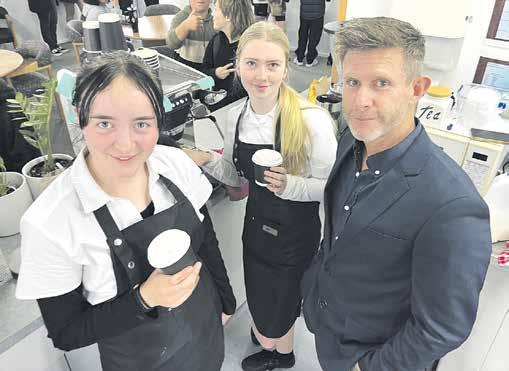

“We are seeking the lost value of our run, damages from discovery (lost income from NZ Post taking our remuneration and giving it to their couriers delivering in the RD3 run), damages for breach of contract (and wrongful termination of contract) and any other potential damages so determined by the court for breach of contract,” Kennedy said.
Last month the Kennedys heard their request for a ministerial inquiry had passed
from State Owned Enterprises minister Paul Goldsmith to Chris Bishop and onto Simeon Brown before it was dismissed in favour of a NZ Post board review.
The couple, through Pro Drive advocate Pete Gallagher, are awaiting a response from the NZ Post board.
The Kennedys sold their Te Awamutu home and moved to the South Island in June. NZ Post declined to comment.
Piopio College’s second open day ever attracted about 50 visitors – including 32 year 6 students who are expected to start there in 2025.
The youngsters, mainly from Piopio and Āria Primary schools, learned about the school’s procedures, and what subjects would be offered later on.
They included biology, PE, outdoor recreation, Māori, art, English, reading, writing and maths.
Rakesh Govind left Piopio to start a
new position in Auckland last month and his replacement principal has not been announced.
Acting principal Ben Draper said he hoped to continue with the “solid planning” at the college for this year and 2025, which included the addition of outdoor learning spaces in the school.
On the open day, parents and future students were treated to barista coffee and hot chocolate made by a senior students.
Continued from page 3
A community trust would be the cheapest for borrowing from the Local Government Funding Agency, but would take some years before it would be in a position to borrow.
Waikato mayors and iwi chairs met last August to discuss Three Waters reform and formed the view they wanted a little more control of what was best for the Waikato, as opposed to reacting to central Government. The outcome was to support individual councils making informed decision on the merits or otherwise on aggregation for the region or sub region.
“We are not here to tell you what to do, we are simply here to pass on information that has been collated by the joint forum. It’s really up to you to decide what’s best for Ōtorohanga District Council,” Payne said.
Across the whole Waikato councils were

expected to spend $7.5 billion over the next 10 years with $5 billion on capital works.
The overall asset condition for Waikato waste water was quite poor, with 44 per cent rating average or better, which in relation to other regions was quite low, Payne said.
Treated Waikato drinking water was leaking at an average of 11 Olympic swimming pools of water every day.
Local Government Minister Simeon Brown and Consumer Affairs Minister Andrew Bayly announced last week that Cabinet had made it easier for councils to borrow to fund waters projects.
New Zealand Local Government Funding Agency Limited can immediately begin lending to water CCOs that are financially supported by their parent council or councils.
Discover our charming one- and two-bedroom cottages at Cambridge Resthaven, where you can enjoy a vibrant community atmosphere in the heart of our retirement village.
These classic brick cottages, built in the 1970s and 1980s, are available to occupy under an Occupation Right Agreement (ORA) basis, starting from $360,000. There is 50/50 shared capital gain benefit if the ORA value has increased when you leave.
Contact: Sandra Fairhurst 07 827 6097
By Paul Charman
Forgotten World Adventures –which runs railcarts over the disused railway line between Taumarunui and Stratford – seems to be bucking the trend for visitor numbers.
The tourism company has recorded better than expected advanced bookings head of the summer season.
A Cambridge couple who have owned the business for two and a half years, Grant Ross and Laura Wackett, say the positive bookings are heartening following a slower than expected previous season.
And now they say they are buoyedup further having earned a Tripadvisor Travellers Choice Award for the second year running. The award is limited to the top 10 per cent of Tripadvisor listing.
“TripAdvisor is by far the largest online travel guidance platform in the world. They have unparalleled authority with travellers and diners. And they only give these awards to businesses that consistently earn great reviews,” Ross said.
“We had a very good first season and an average past season. That was mainly due to the elections and New Zealander’s relationship with politics - we tend to clamp down and await which government will get in with which policies. As our guests

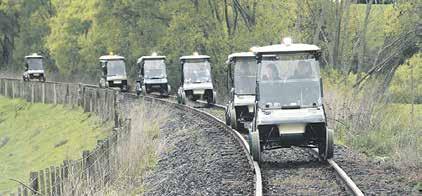
are predominately Kiwi – 72 per cent domestic – 28 per cent internationalwe felt the effect.”
The business received glowing reviews throughout.
“In all, 88 per cent of our reviews are five star, with 10 per cent star. That’s extremely rare; especially given we have over a thousand reviews,”
Ross said.
“This is judged across all categories: restaurants, tourism, ice-cream shops and so forth, which gives it even more weight as we’re obviously talking millions of businesses.“
Ross said despite the recent slowdown things appeared to have completely turned around for next year.
“All indicators suggest we will be having an excellent 2024-25 season.
We’re running an Early Bird for the first time, similar to the mountain pass, and it’s exceeded our expectations. We’ll be going into the season on October 12 with many dates already full.”
He said there had also been an increase in customers from the South Island.
“We have grown international only slightly since we’ve taken over but are now striking up relationships with in-bounders and overseas agents to increase this going forward.”
Ross said Waikato had taken over from Auckland over the past season as the company’s biggest feeder regionby a whisker
Australia had become its fifth biggest feeder region ahead of Bay of Plenty.
The Conservation Department is heartened by the response to calls for volunteers to help with a round of baiting in the Mapara Wildlife Reserve.
Claire Jones, a Biodiversity Ranger in Maniapoto, is leading the operation this weekend to bait hundreds of stations across the reserve.
In June the department’s Maniapoto team called for volunteers to contribute a few hours to the protection of kōkako.
The King Country reserve is a habitat for significant population of kōkako – which have been brought back from the brink of
extinction.
In the late 1980s it was estimated 350 pairs remained. By 2006 there were around 1400 birds and when 1660 pairs were estimated to be in the wild in 2021 the bord was classified as “at risk–recovering”
Mapara is 1435ha of steep and undulating terrain at points with access via tracks and over farmland. There is a network of 2200 bait stations, 50m apart, along bait lines which follow the spurs, ridges and gullies.
Three rounds of baiting will take place before the start of the birds’ breeding season.
Applications for The Lines Company’s Inspiring Local Minds Scholarship are being taken this month. On offer is three amounts of $6000 to support studies over three years.
“Helping local young people realise their potential through tertiary education is important to us at The Lines Company,” chief executive Mike Fox said.
“In the past we have supported students through a range of studies from science, technology and law to commerce and marketing.”
Scholarship recipients are chosen by a selection panel that includes TLC’s chief executive and customer and community engagement manager alongside a trustee from TLC’s shareholder Waitomo Energy Services Customer Trust.
The programme was introduced in 2018, and 26 young people have been awarded scholarships. Recipients must live or go to school in TLC’s network area which take in much of the King Country and extends to Ōtorohanga.











KC U14 v NPBHS U14 August 17 12.30pm Taumarunui
KC Trailblazers v Thames Valley August 17 1pm Waitakaruru
KC Rams v Mid Canterbury August 17 2.30pm Taumarunui
KC S.S. girls v Thames Valley August 24 11am Te Kuiti
KC Trailblazers v Whanganui August 24 1pm Te Kuiti
KC Big Horns v Whanganui Dev. August 24 TBC Whanganui
KC Rams v Buller August 24 2.30pm Westport
KC U16 v Waikato August 25 1pm Te Kuiti
KC U18 v Hawke's Bay Co-ed August 25 1pm Taupo
KC U16 v Thames Valley August 31 1pm Te Kuiti
KC S.S. girls v Taranaki August 31 1pm Clifton
KC Trailblazers v Wairarapa Bush August 31 1pm Turangi
KC U18 v Thames Valley August 31 1pm Te Kuiti
KC Big Horns v Thames Valley Dev. August 31 3pm Te Kuiti
KC Rams v Thames Valley August 31 5.30pm Te Kuiti
KC S.S. girls v Counties. Man September 7 1pm Taupo
KC Big Horns v Waikato Div. XV September 7 1pm Putaruru
N.I. Heartland Women’s finals September 7 TBC Masterton
KC Rams v South Canterbury September 7 2.30pm Timaru
Heartland U16 Carnival September 7-8 TBC Turangi
KC U18 v Ngati Porou East Coast September 8 11.30am Whangaparoa
KC S.S. girls v Bay of Plenty September 14 10am Tauranga
KC U16 v Waikato Maori September 14 12.30pm Otorohanga
KC Big Horns v Counties-Man. Div. September 14 12.30pm Taupo
KC Rams v West Coast September 14 2.30pm Taupo
KC U18 v NZ Vikings September 15 TBC Whangarei
KC U16 v Taranaki September 21 12.30pm Hamilton
KC S.S. girls v Waikato September 21 1pm Te Kuiti
KC Rams v Poverty Bay September 21 2.30pm Gisborne
KC U18 v NZ Harlequins September 21 3.30pm Hamilton
Northern Regions U18 girls finals September 28 TBC TBC
Northern Regions U16 Carnival September 28 TBC Te Awamutu
KC U18 v Wairarapa Bush September 28 12.30pm Taihape
KC Rams v North Otago September 28 2.30pm Te Kuiti
KC Rams v Whanganui October 5 2.30pm Whanganui












































Every six years councils are required to review their representation arrangements to ensure they’re structured to best serve the needs of their communities.
Council has proposed to make no changes to the current representation arrangements for the next election. This will mean that:
• there will be six elected members on Council and one mayor,
• members will be elected from one of two wards (Te Kūiti Ward, and Waitomo Rural Ward)
• three members will be elected from each ward, and
• there will be no community boards.
Council has adopted the fees and charges schedule for the 2024/25 Financial Year. They came into effect on 1 July 2024.
Due to the increased operating costs, most fees and charges have increased by 5% in line with current inflation. We need to ensure costs are recovered so that Council services are not further subsidised by rates.The schedule of Fees and Charges is available on our website.
Have your say by Monday 2 September 2024 at www.waitomo.govt.nz/haveyoursay

On 25 June, Waitomo District Council adopted its Long Term Plan 2024-2034 after many months of planning and consultation.The plan outlines the direction for the Council for the next 10 years and sets a pathway to achieve its community outcomes through various strategies and actions.

The total rates requirement is $25.4 million for the 2024/25 year, an increase of $2.5 million compared with the 2023/24 year. This equates to an overall rates increase of 11.07%, which is mainly driven by inflation but also the need to mitigate against severe storm events and other core business requirements.
Individual property rates will vary due to how certain activities are funded and the services received by the property. Visit our website for more information.

Satisfaction with Waitomo District Council’s (WDC) services and facilities has risen across most areas, according to their recent resident satisfaction survey.
Each year WDC undertakes a survey to gauge opinions on the performance of Council, measuring satisfaction against performance targets for the financial year.
The results identify where there is scope for improvement which can be factored into planning for budgets and service levels in the future. The survey is also used to measure 12 of Council’s KPIs and is used in the 2023/24 report on actual performance.
Overall, the results of this survey have been very positive. Two measures (communications and library) have remained the same and several other measures have increased in satisfaction compared to 2023.


Are you eligible?

Waitomo District Council administers a Rates Rebate Scheme, which offers help to low-income ratepayers with their rates account.
You could be eligible for a maximum of $790 so it’s worth enquiring!
The entitlement amount is determined by a combination of your income, amount of rates you’re charged and the number of dependents you have.
Applications for the 2024/25 rating year close 30 June 2025.
For more information or to apply visit our website. Join Waitomo District Library’s new app designed to encourage reading!
Track

Chief Executive Ben Smit says it’s important to understand the community’s opinions on Council over the last year as it helps capture how we’re tracking.
“Overall there is a high level of satisfaction with Council’s services. We would like to thank residents for taking the time to participate in our survey,” he says.
“We’re really pleased with the results. We know that our services and facilities play a vital part in our residents’ lives so it’s important we do our best to get it right.
“Our staff work hard to meet the expectations of the community, so I know they’re proud their efforts have been recognised.”
Visit Council’s website to read the full media release and to read the full report and results.



Two cars were badly damaged following a head-on crash on Carroll St, Te Kuiti about 7pm on Saturday.
Police were called to six family harm incidents and two mental health callouts.
Piopio
August 8: At about 1.40am a resident in Aria Rd complained of being woken in the middle night by what he thought was a loud motorbike being revved up outside their address. A police investigation determined another resident in the road was doing repairs on a V8 car and then revved it up near the resident’s place.
Te Kūiti
Police attended seven family harm incidents.
August 7: At about 9.45am police stopped
a car on Te Kūiti Rd. The 18-year-old Te Kūiti driver was found to be driving while disqualified and his vehicle impounded. Charges are pending.
August 7: Police attended a single vehicle crash at about 8.30 am on Troopers Rd. A driver veered a car onto the road shoulder and lost control in loose gravel, spinning and going through a farm fence. There were no injuries and police said inexperience played a part in the crash.
August 8: At about 7am police stopped a speeding utility on SH3 at Hangatiki. A blood test for drink driving was taken.
August 10: At about 7pm police attended head-on crash on Carroll St. A south-bound car allegedly strayed over the centre line and police issued an infringement notice to its 21-year-old driver. Both cars were extensively damaged. There were no injuries to their occupants.
August 10: At about 11.20pm police stopped a car on William St and processed its 20-year-old female driver for drinkdriving after she returned a result of 688mg of alcohol per litre of breath.
August 11: Police received a complaint that three woman had attacked people at a party at a house on George St the previous night. It was alleged that one of the group had lunged at the occupant with a knife. Another of the women allegedly swung
punches at the occupant before all three left the address. Inquiries are continuing.
Te Kūiti
August 8: Both Te Kūiti and Piopio Brigades were called to the scene of a truck fire about 7-8 km north of Te Kūiti. The fire, which was out upon the arrival of the two fire crews, was thought to have been caused by an electrical fault.
August 5: At 4.11 pm the brigade was called out to assist St John with a medical case in Hinewai St. They were stood down before arriving but then called out to the same address at 4.43pm.
August 6: At 9.23 pm they were called to another medical incident, this one at a house on Kiokio Station Rd.
August 10: At 2.22pm the brigade was called to a house fire in Old Te Kūiti Rd. The brigade sent its two fire trucks, a tanker and a ute. The house was fully involved when the brigade arrived, and they were unable to save it. The cause is being investigated.

Police believe a car involved in a head on smash at Waerenga last week had been involved in a near-miss near Te Kūiti just two days earlier.
The second crash resulted in injuries to two drivers, who were taken to Waikato Hospital.
Sergeant Jimmie Walker of the Ōtorohanga police said both incidents involved the same vehicle straying over the centreline and into the path of oncoming cars.
The earlier incident had been reported to police by a motorists who provided dash cam footage of the car heading north – and then straying into a south bound passing lane into the path of another car.
Walker said there is no suggestion that the person at the wheel of the car was a tourist.
The first incident, on August 6, happened about 1pm.
A northbound motorist used a dashcam to record a Toyota Rav 4 as it descended Awakino hill toward Te Kūiti, and then began driving in the oncoming passing lane.
The wayward car almost caused a collision, and the driver made no attempt to swerve, Walker said.
The August 8 crash happened about 2pm, on Cozen Road, Waerenga.
Walker said the Rav 4 driver suffered serious injuries, the other drive minor injuries.
MLZNTMSRETTFEHSARC AEKCMPQLGAZXPKWORR REUEIPUTROEHLXAWYP BLLINRGRALPAKMKHSW MBFTCCYABFWCLOMPWZ EMHHEPSALLYOATLRTD

Across 1. Muscle spasm (5)
4. Downpour (6) 7. Chop (3)
8. Favour (6) 9. Couch (6) 10. Self-examination (4-9) 14. Perilous (5) 15. Musical instrument (5) 18. Clumsy person (colloq) (13)
Last week
23. Annoyance (6)
24. Absolutely right (inf) (4,2) 25. Kernel (3) 26. Thing made by combining two elments (6)
Narrow lane (5)
Collectible (5)
Terrible (5)
Package (6)
Arid area (6)
Door fastener (5)
Inexperienced (5)
Rub hard (5)
A surprise outcome (5)
Senseless (5)
Shine (5)
Chum (6)
Afternoon nap (6)

















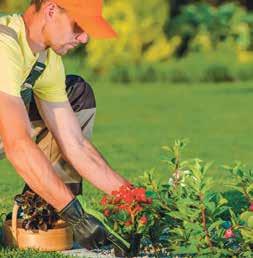






















They won three and lost three. And given the competition on the northern summer shearing tour, that was a good result, team New Zealand team manager Mark Barrowcliffe said.
The wins came while on the Wools of New Zealand Shearing Sports New Zealand tour, which saw Te Kūiti shearer Jack Fagan and teammate David Buick, of Pongaroa, claim test match wins at the Great Yorkshire Show, in France and the Royal Welsh Show.
“As team manager their preparation before and after the shows was exceptional,” Barrowcliffe said.
“They really had a handle on the sheep because they are so different to New Zealand sheep, and the United Kingdom has got such depth in their shearing at the moment.
“The northern sheep are generally smaller and trickier, he said. They were a lot more open than the sheep in New Zealand and had less wool around the points.
“Just getting out of the heats is a mission and as a judge I’m there thinking this level is so high, it’s incredible. That was really cool to see, just the finish the UK shearers can achieve on their sheep.
”Over five sheep in a heat it was hard to have a real time influence, he said. “Obviously the further down the competitions we got as in semis and finals we had the speed to drag them along or force mistakes out of them, which was cool,” he said.
“Three times out of six we beat them and the other three they beat us. Out of a whole series thats three tests each, which was good.
“What I’m meaning is in the heats it’s very hard to get much of a time advantage, but over 10, 20, you can push the time question.
“It was so tight in one of our test wins that per shearer, there was a two second time difference. So if each shearer had shorn two seconds slower or faster, the result would have been the other way - over 20 sheep, which is incredible.
”It made for an exciting series. There were big crowds at the venues, who really got in behind their own home side and pushed them along.
“It was really good to be part of,” Barrowcliffe said, praising the New Zealand shearers’ professionalism: “To be able to handle that pressure of shearing sheep that




Federated Farmers and Dairy New Zealand have welcomed updates to the Resource Management Act
Dairy NZ director Cameron Henderson, a Canterbury farmer, said “a few stomping feet” had been about to set off an avalanche of red tape that would have effectively prohibited agriculture and horticulture in New Zealand.
The updates were made to regulations relating to discharge.
Henderson said the change in interpretation of the law threatened to create regulatory roadblocks that no farm or farmer could pass through.
“We strongly believe this was never the intent of the law, given permitted activities and consents come with requirements to manage risks to the environment.
“This isn’t a free pass.
“Farmers still need to meet national and regional regulations.
“These amendments simply provide clarity that the regulatory pathways regional councils have spent years and millions of dollars developing will prevail.
Dairy New Zealand, Beef and Lamb New Zealand and Federated Farmers wrote to the government in April to outline what it said were the severe consequences of High Court decisions relating to sections 70 and 107 of the Act and included these concerns in a formal submission in June.
Federated Farmers RMA reform spokesperson Mark Hooper said the ruling had created huge uncertainty for farmers and without a law change, huge parts of New Zealand’s productive economy would simply grind to a halt.
“This whole saga has benefited nobody but resource management lawyers, costing
ratepayers millions of dollars, only for the law to be changed.
Henderson said without the new amendments, pastoral farming in Southland, horticultural production in Pukekohe and Horowhenua, and discharges of wastewater and stormwater by a council would have faced impossible regulatory barriers.
“This issue has been sparked by the implementation of national freshwater regulations, which were impractical due to a lack of consideration of regional variations, unrealistic national bottom lines, and a focus on numerical limits rather than environmental outcomes.
“This issue had become urgent and warranted immediate attention, and we appreciate the Government moving swiftly to ensure diffuse discharges are managed in a practical way.”
He noted 80 per cent of dairy farmers were now managing a Freshwater Farm Plan.

Tests suggest water quality is improving in the King Country, but a national report paints a more challenging picture.
King Country River Care members met at Piopio last week to discuss water quality risks and solutions.
River Care sub catchment groups have been testing water quality since early 2021 to determine levels of nitrates, phosphorus, e.coli and water clarity.
Latest results showed improvement in most areas and increasing biodiversity in the
ecosystems.
The tests were initiated to get a better understanding of water quality over the region because testing done by Waikato Regional Council was limited.
At the same time, it was revealed that numbers used in the National Policy Statement for Freshwater Management 2020 are such that even if the country’s agriculture was closed down, the national bottom lines for e.coli and sediment would not be achievable.
A review, by independent environmental
consultants Torlesse Environmental Ltd, found up to 38 percent of rivers would still not meet the suspended fine sediment national bottom lines.
Beef and Lamb New Zealand wants changes to the sediment and e.coli attributes and national bottom lines following the release of the review, which it says shows the way they were determined was flawed, they are not achievable, and trying to achieve them will decimate farming and rural communities.
Policy workshops continue – See Page 5
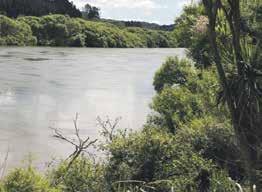

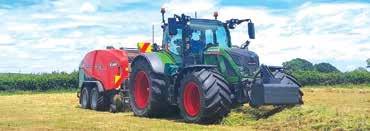


• Kuhn Combi Round Baler / Wrappers - Net / Film on Film option
• Case Big Square Baler & Wrapper
• Forage Harvester with Trucks or Tractors / Trailers
• Full Mowing Services
• Bale Stacking


• Full service available- Disc, Power, Harrow, Plant
• Striptill Maize Spraying
• Striptill Maize Planting
• Row Crop Side Dressing / Spraying of Maize post planting
• Spray options - 15 metre boom on Spray Truck - 24 metre boom on Tractor Sprayer
• Maize Silage contracts available
• Solid Muck Spreader for effluent / Drain Cleanings / Chicken Manure
• Bobcat for calf sheds
• Digger
• Metal Cartage
• Level Blade for tracks
ROUND OR SQUARE HAY AND SILAGE FOR SALE

King Country sheep and beef farmers have long complained they are forced to watch pastureland disappear under pines
Now they seem to have an ally in the influential New York-based media company Bloomberg, which has weighed into the Kiwi carbon farming debate, pointing out some of the shortcomings of offsetting emissions by planting pines.
In the article, headed “Millions More Trees Isn’t the Climate Fix New Zealand
Thought”, Bloomberg gives voice to sentiments popular among hill country pasture farmers.
It quoted Parliamentary Commissioner for the Environment Simon Upton’s recent report on land-use change, in which he says pine production and permanent forestry are legitimate land uses… but afforestation should not be incentivised by treating it as a cheap way to offset fossil fuel emissions.
Bloomberg said this amounted to an aggressive challenge to one of the world’s most prominent campaigns for afforestation.
Since 2019, New Zealand has added 175,000 hectares of forests, almost all the fast-growing, carbon-sucking
Pinus Radiata, helping New Zealand make progress toward its 2050 net zero goal.
But the new growth has subsumed the nation’s farmland, the beef and sheep lobby says, undermining the meat-and-dairy industries.
Increased waste from forestry — the logs, leaves and branches known as “slash” — more than doubled the damage of the flooding caused by last year’s Cyclone Gabrielle.
While those might be worthwhile trade-offs for significant long-term reductions in climate-warming CO2, the current system doesn’t really achieve that either, experts say.
Forests absorb a lot of carbon dioxide, but their efficiency wanes over time.
To achieve the same environmental effect over decades, “you’re going to have to keep planting more and more forests,” said John Saunders, a senior researcher at Lincoln University’s agribusiness and economics research unit.
“That isn’t actually solving the problem.”
The seeds of New Zealand’s recent forestry boom were planted in 2019, when the country’s emissions trading scheme required companies to use only domestic measures to compensate for CO2.
In practice, it prohibited firms from buying carbon offsets developed abroad to
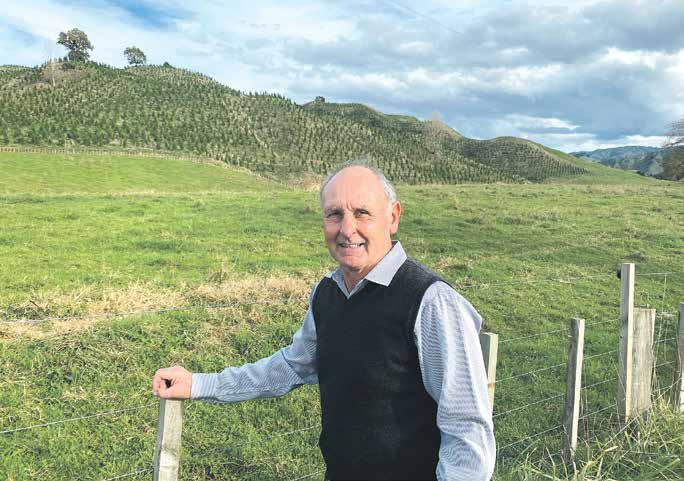
their carbon footprint.
At the same time, the new rule amplified an existing, and unusual, feature of the policy. Companies doing business in New Zealand are allowed to offset 100 per cent of their emissions with credits generated by domestic forest projects.
A 2019 policy change spawned more
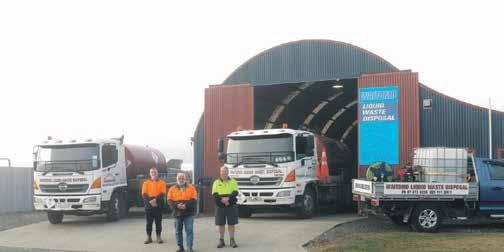

than 150,000 hectares of new trees, the Bloomberg article said.
The land-grab created opportunities for New Zealand farmers as well, driving up the price of land.
The 30-year net present value of land with production forestry and carbon credits is NZ$21,300 a hectare, 144 per cent more than the expected returns from sheep and beef, said Julian Ashby, chief insight officer at Beef and Lamb New Zealand.

“The enormous additional returns from carbon means that foresters have been able to offer significantly more for land,” Ashby said.



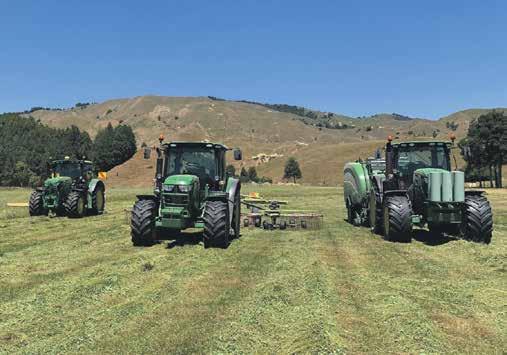


By Cheyne Waldron, Partner/Chartered Account, Bailey Ingham Ltd
Survive until 25 has become a common phrase in the media over the past yearreferring to businesspeople and individuals who have been dealing with the increased cost of living, and for many businesses, reduced profits as consumers have reduced their spending on non-essential items.
The phrase is also relevant for many farmers who have contended with negative factors including inflation and increased on farm costs, higher interest rates, and a severe slowdown in international economies, which has reduced consumer demand and export returns.
Statistics from Beef + Lamb New Zealand tell us the level of profitability for sheep and beef farms is the lowest since 2008. The 16 per cent on farm inflation for the 2023 financial year was the highest since 1981.
A recent Dairy New Zealand report noted average on-farm operating expenses are above $6 per kilogram of milk solids. The global push to reduce farm methane emissions continues to be a threat that we cannot ignore.
The flow on effect of reduced profitability in the agriculture sector has affected all parts of the economy. Fortunately, there are positive signs around the corner.
Inflation is clearly on its way down with the latest update showing a rate of 3.3 per cent, almost within the Reserve Bank’s target band. Interest rates have already started falling in response to the reduced inflation figures. Some key farm input costs such as fertiliser prices have also eased.
The long-term outlook for dairy prices is also lifting. Banks are being supportive and offering cashflow and other assistance where necessary.
While some parts of the country have



been dealing with floods, cyclones and droughts, we have been reasonably fortunate in the Waikato and King Country with good seasons climatically, and hopefully this continues.

One thing is clear and that is people all over the world will keep liking our high food quality and will be prepared to pay for it.
Recently I spoke at the annual Farmers Party at the Ōtorohanga Club.
A couple of key points that I shared were: Ensure you have a good understanding of your financial position.
Take ownership of your numbers and understand your budget and cashflows for the year ahead.
Control your costs and eliminate unnecessary spending, but not to the long-term detriment of your farming business.
Remember you are farming for profit, and it is not necessarily higher production that achieves that.
Communicate well and keep in touch with your bank manager. If you have a cashflow shortage coming up at any time, let them know early so plans can be put in place.
Build a good team around you. If you are under stress and have problems, talk to people. Get along to farm discussion groups.
While many farming businesses have seen lower profits and challenges still exist, well run farming businesses will endure, and we are positive that agriculture and our farming community will continue to have a great future.
By Stu Kneebone, Waipā-King Country Councillor
Following the recent decision by the board of Waikato’s economic development agency Te Waka to wind up its operations, the Waikato Regional Council (WRC) has been giving consideration to what role it can play as a regional leader to assist in bringing sectors together to understand how best to facilitate and encourage economic development in the region.
As the fourth largest region in New Zealand, both in terms of population and geographic area, the Waikato is a key part of the economy. However there are concerns that it has not always spoken with a collective and unified voice when looking to capitalise on regional economic development and investment opportunities. In this regard, it has lagged behind other regions.
The Government has signalled it wants to work with regions that are well coordinated and know what they want. This theme is not unique, and many previous administrations have signalled similar messages.
While many individual district councils across the Waikato contributed to funding Te Waka, along with the WRC, it was a somewhat piecemeal approach, which no doubt contributed to the challenges faced by Te Waka.
The WRC contribution was funded by returns from its investment fund which dates back to 1989 when the council was established. Shares in the Ports of Auckland and Tauranga were provided to WRC (all Regional Councils throughout NZ became shareholders in their respective ports) by the government of the day.
The WRC shareholding was subsequently sold by the council of the day, and the funds invested. This fund is today managed by an investment fund advisor.
The returns from this fund are utilised in accordance with WRCs Statement of Investment Policy & Objectives.
Several years ago, council established a Regional Development Fund (RDF) in an effort to make contestable funds available for regionally significant economic development projects, funded by a portion of the investment fund returns.

However the fund was not well subscribed, and so was recently wound up. Council is looking at how the residual funds accumulated during the life of the RDF can be best utilised for strategic regional economic priorities and development activities.
This is not something that council are rushing.
This fund is an intergenerational asset, and council is cognisant of the need to utilise the returns it provides wisely and in the interests of the region as a whole.
Our chair and chief executive are initiating conversations with a range of stakeholders, including iwi across the region to understand their views on economic development functions, what roles the various stakeholders can or should play, and what everyone sees as the appropriate vehicle to deliver these functions could look like.
WRC does not have a particular view on what the outcomes of these discussions could be, however the main themes underpinning the WRC desire to progress these conversations are really about wanting the region to prosper and ensuring that our region is seen by government as a strategic and worthy investment partner for investment.














New Zealand exported red meat worth $914 million during June, a two per cent increase on June 2023.
The US was the largest market again, with exports up 14 per cent to $303m. Japan was up 53 per cent to $61m, the UK up 66 per cent to $53m, and Canada up 94 per cent to $51m. China was worth $176 million.
While the China market remained soft, some recovery was expected in 2025 and other key markets were seeing positive returns, Meat Industry Association chief executive Sirma Karapeeva said.
“This was the first time since July 2017 that China hasn’t been the largest market by value for sheepmeat,” Karapeeva said.
“Beef exports to China were also down but overall exports remained steady due to strong demand from the US, Japan and Canada.
These trends were also reflected in the data for the second quarter and for the year to the end of June with the value of exports down for China but increasing to most other key markets.”
The US was the most valuable sheepmeat market for June, exports totalled 29,829 tonnes, up 22 per cent from a relatively low level for June 2023. Value only increased by eight per cent, to $294m, due to the lower value of exports to China.
The US imported NZ sheepmeat worth $62m, with China dropping by 39 per cent to $52m. Beef exports increased one per cent by volume to 50,907 tonnes and three per cent by value to $470m.
Beef exports to China were down 44 per cent to $83m but exports to the US rose 16 per cent to $221m, 101 per cent to Japan to $46m and 112 per cent to Canada to $35m.
Fifth quarter exports were unchanged from last year at $150m. Fifth quarter exports were down three per cent to $518m.
Decreases in exports of casings and tripe, down 12 per cent to $94m, and meat and bone
meal, down 11 per cent to $57m, were partially offset by a large increase in exports of blood products up 92 per cent to $65m.
Overall exports for the 12 months to the end of June, were down seven per cent from 2022/23 to $9.9bn.
China remained the largest market for the year but exports were down 32 per cent to $2.86 bn.
The US took 27 per cent of total exports compared to 21 per cent last year, with an increase of 16 per cent to $2.66bn.
The next three largest markets were Japan, up 13 per cent to $490m, the UK, up 45 per cent to $456m, and Canada, up 58 per cent to $370m.
Sheepmeat volumes increased by three per cent to 389,509 tonnes, but the weak China market saw value fall nine per cent to $3.59bn.
Exports to North America and the UK increased by volume and value.
Volumes to the EU were unchanged but value fell by 10 per cent.
Beef volumes also increased by three per cent to 511,736 tonnes. However, value fell by four per cent to $4.42bn, largely due to China, where exports were down 35 per cent to $1.27bn. This was partly offset by growth into the US, up 30 per cent to $1.74bn, Canada up 106 per cent to $209m, and recovery to Japan up 27 per cent to $328m.
The value of beef exports to the US was also significantly higher than to China.
While New Zealand exported only 9000 tonnes more beef to the US compared to China during the year, the exports to the US were worth $470m more, which is highlighted by the respective free on board (FoB) value of $9.29/ kg vs $7.12/kg to the two markets.
After a full year of the free trade agreement (FTA) operating, the UK was one of the top 10 beef markets for 2023/24, the ninth largest by volume at 3881 tonnes and eighth by value at $48m.
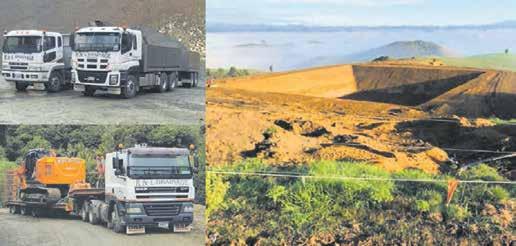
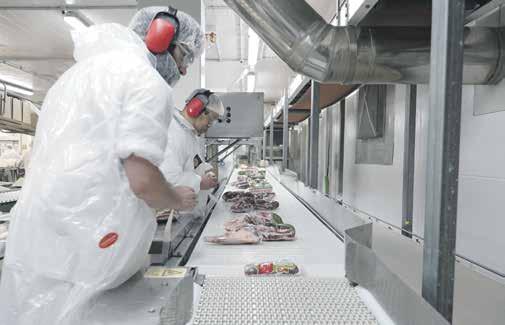
New Zealand Beef and Lamb’s policy workshops return to the King Country this month with a meeting in Piopio.
Policy and advocacy general manager Dave Harrison said the previous round of workshops gathered material to support the continued delivery of a freshwater policy work programme.
The last round of workshops made it clear the regulatory environment was hindering farmers from making progress and causing real concern about the future, he said.
It emerged that farmers wanted to complete plans themselves, and that they should not need multiple farm environment plans. They also disputed the need for a two-step certifica-




tion and auditing process.
Harrison said a disconnect with regional councils was expressed, and farmers found their processes complicated.
“Many of the proposed rules were not workable, and farmers felt ignored by councils.”
Beef and Lamb would continue to tell councils that active engagement with rural communities and farmers was crucial within regional planning processes, Harrison said.
The development of a response to the Government’s environment policy changes was ongoing and there would be further opportunities for farmers to get involved.

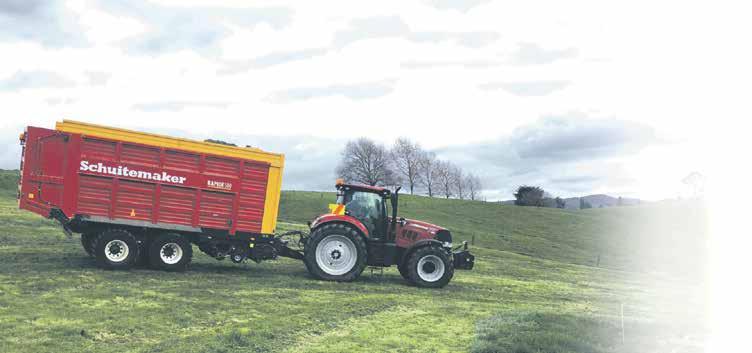
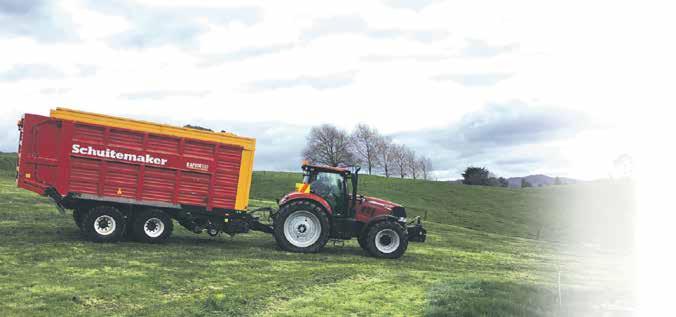







It’s called Map and Zap, and it is being touted as the next answer to weed control.
It is a laser weeder which uses Artificial Intelligence – AI - to distinguish between wanted and unwanted plants.
A prototype designed by a group of AgResearch scientists and engineers led by Kioumars Ghamkhar, was put through its paces at a recent demonstration at a Canterbury vineyard.
AgResearch is now looking for investors to take the technology to market.
“It’s not to replace chemicals, but it’s going to reduce the use of chemicals over time,” Ghamkhar said.
The prototype can be set to target only those plants that are unwanted and guides the laser to the weed to destroy it.
A Map and Zap unit can be to a tractor or robot to operate in a vineyard, orchard or paddock growing vegetables or pasture.
Wine industry business adviser Heath Stafford, who was among those to see Map and Zap in action at the vineyard, says they system can helped fill a gap in weed management.
“We can’t get rid of herbicides immediately, if at all, but we do need to embark on a technology pathway that largely eliminates the use of herbicides,” he said.
If Map and Zap could prove its worth in trials, he thought it had a “fantastic chance” of being successful on the global stage.










An interview this week with Friends of Brook Park committee member about the recent pond planting at Motakiora/Brook Park led to a deep dive into Te Kūiti farming history by journalist Sigrid Christiansen.
While well-known in New Zealand agriculture in the decades after World War II, Te Kūiti farmer Colin Sutherland Brook is now just a name on a sign for some.
And in some ways, his life is still a mystery, with little publicly available information about his life.
Brook was a farming trailblazer who combined a dental practice in the town with the running of the 52ha property, which was purchased by the local authority after his death.
In 1939, just two years after electric fences were patented by Waikato innovator Bill Gallagher, who initially electrified a car to protect it from a horse that liked to rub against it, Brook set one up on his Te Kūiti farm.
It was so ahead of its time that it would be over a decade before, in 1961, it was legal to link such fences with mains electricity. Prior to that date, they were battery powered.
On the eve of the Second World War, Brook wrote in the New Zealand Journal of Agriculture that he had bought the property just 15 months earlier, and found the country in a “rough, deteriorated state”.
He described his experiment of putting up 5.5km of electric fencing as “an unqualified success”.
The technology was so new that the purpose of writing to the journal was to share the innovations with farmers across New Zealand.
“Electric fencing opens up a new possibility for closer and more economic subdivision [of paddocks],” Brook wrote.
In one picture caption used with the article, he wrote, “Note the close grazing on the land on the near side of the fence. Cattle and sheep graze right up to the fence, but not through it.”






The innovation didn’t impress everybody. Before his death in 2022, the dedicated horseman Peter Holbrook shared with this author that – when he was working for an Aria family in the 1970s, the adoption of electric fences meant he could no longer as easily ride a horse in his everyday farm work.
“You used to be able to ride a horse over open country all day long.
“But after the electric fences came in, you couldn’t just tie your horse anywhere and do what you needed to do,” he said.


When Friends of Brook Park committee member Dr Elly Kroef spoke about the recent planting by Te Kūiti High School students and others of a pond area at Motakiora/Brook Park – it slightly opened the door into the life of Colin Brook, the dentist with a penchant for farming technology.
After his experiments with electric fencing Brook went to Colin Brook in uniform




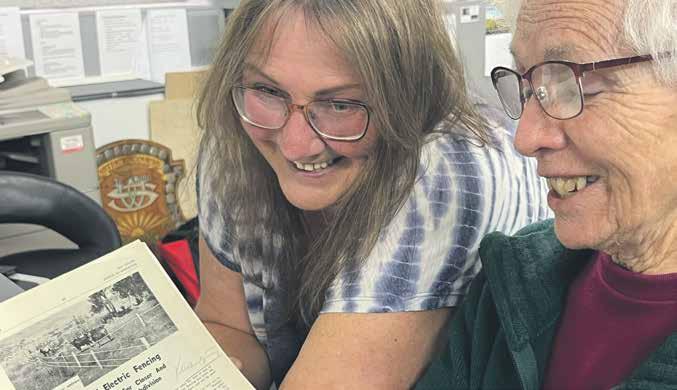
Italy during World War II… and came back inspired about how farmers could make the most of trees.
Waitomo District Council’s Rosemary Williams explained in the Footprints in History journal how the experience of seeing the tree-covered land in Italy was “a turning point in his thinking”.
“He saw whole valleys, that from a distance appeared to be forested with trees, but under this canopy were grown the crops and vines that for hundreds of years had formed the basis of Italian agriculture.
“His aim was to protect the face of the land from climatic excesses: too much burning sunshine, too much drying wind and too much driving wind,” Williams wrote.
Today, the sheep of Brook Park graze under the trees he planted – and many of today’s farmers take on similar ideas
to increase their property’s drought resilience as the climate becomes hotter and drier.
According to the Waitomo District Council, Brook Park’s exotic tree collection was, 15 years ago, augmented by the Barry Blackman collection of conifers. Blackman donated his collection of approximately 300 plants, which were transplanted from his property and from Redwood Park in Te Kuiti, to Brook Park –Motakiora in the autumn of 2007.
Alongside the plantings, which helped stabilise the soil, Brook also created a reticulated water system described by this paper in 2010 as “one of the first flood protection dams in the country.” By controlling the runoff from his property, the pond system resulted in water taking six days to drain – where previously it took six hours.
Cows on bail
A new sensor system by MSD Animal Health will enable herd management technology used in rotary milking system to be available in the more common herringbone sheds. The system uses photoelectric sensors placed above a purpose-built platform entrance chute and if a cow changes position after they enter the chute, the software enables the milker to reorder or rematch the cow to the correct bail.
The latest survey of 1400 dairy, sheep, beef, and arable farmers has found that confidence is at historic lows. Federated Farmers President Wayne Langford said 12 months ago 3.5 per cent of farmers reported making a loss – the figure jumped to 27 per cent in July survey.
New Zealand will not sign up to a new trans-Tasman standard on infant formula, which includes tougher labelling requirements. Food Safety Minister Andrew Hoggard said the government will instead implement a New Zealand standard over the next five years.
August temperatures in the top half of the North Island are likely to be above average, but a cold snap with frosts is expected at the end of the month. NIWA’s regional predictions for August-October forecasts similar chances for rain. Soil moisture levels are given a 45 per cent of being near normal while river flows are 50 per cent likely to be below normal.
Federated Farmers says changes to drinking water rules are a major win for rural communities. Those supplying fewer than 25 people with drinking water will no longer be required to comply with new rules or register the details of their water supply arrangements. “The drinking water rules introduced by the previous Government were a massive regulatory overreach that would have made life incredibly difficult for 80,000 rural and remote households,” Federated Farmers local government spokesperson Sandra Faulkner said.
An Enduring Power of Attorney (“EPA”) is a legal document that allows you to appoint one or more trusted individuals to make decisions on your behalf if you become incapacitated. There are two types of EPAs:
Enduring Power of Attorney for Property: This type allows you to appoint someone to handle your financial and property matters, including managing farm assets, investments, and other property. In a rural context, this is crucial for ensuring that agricultural operations and farm management continues without disruption. Enduring Power of Attorney for Personal Care and Welfare: This allows you to designate someone to make decisions about your personal care and health, including medical treatment and living arrangements. In rural areas, where specialised healthcare services might be less accessible, having a trusted person manage your care can be particularly important.
What happens when a person does not have an EPA?
When a person does not have an Enduring Power of Attorney (EPA) in place, the management of their financial and personal affairs can become complex and challenging if they become incapacitated. This situation can lead to several potential issues, including delays, disputes, and additional stress for family members. Here’s an example illustrating the impact of not having an EPA for Property or for Personal Care and Welfare.
Farmer Frank
Background: Frank, a 65-year-old farmer living on his own in rural New Zealand, has always managed his own affairs diligently. He owns shares and is the director of his farming company, has several large investments, and a bach in the
Coromandel. He separated from his wife many years ago and his two children live in London. Even though Frank has made a Will, he has never quite got around to setting up an Enduring Power of Attorney. He thought he would get to it when he was “older”.
The Incident: One day, Frank is in the milking shed doing the morning milking while his farm worker is away on holiday, and he unexpectedly suffers a severe stroke. He is rushed to the hospital and, while his physical health stabilises, the stroke has left him with significant, permanent cognitive impairments that prevent him from managing his financial and personal affairs.
The Issues:
• Financial Management: Frank’s bank accounts and farm operations require immediate attention. Bills need to be paid, and important financial decisions must be made to maintain the farm’s productivity. Without an EPA, there is no designated person authorised to handle these matters on Frank’s behalf. The bank requires any designated person to produce evidence that they have been legally appointed as Frank’s EPA for Property to be able to make payments from the farm account.
• Healthcare Decisions: Decisions about Frank’s ongoing medical treatment and personal care need to be made. Without an EPA for Personal Care and Welfare, there is no clear authority to make these decisions. This could lead to potential delays and uncertainties in relation to Frank’s care, for example, where Frank will now live, as he can no longer manage at home alone. Residential care homes require that all residents hold an EPA for Property and for Personal Care and Welfare.
• Court Applications: Because Frank does not have EPAs in place, Frank’s family must apply to the Family Court to appoint a property manager and welfare guardian. This process is time consuming and costly. The cost of a Court application is roughly six times the cost of obtaining both EPAs from a lawyer, and that’s if everyone in the family agrees.
• Family Disputes: The absence of a clear legal document outlining Frank’s wishes can lead to disagreements among family members about how to manage his affairs while the Court orders are being obtained. This can cause tension and conflict, especially if family members have differing opinions on what actions should be taken or who should be appointed by the Court as the property manager and welfare guardian. If there is disagreement, this substantially increases the time and costs involved in the Court application.
• Farm Management: Without EPAs in place, the day-to-day operations of Frank’s farm may be disrupted. There may be delays in paying farm workers, managing livestock, and/or dealing with suppliers, potentially leading to financial loss. One of the immediate issues on the farm is that the cows need to be milked and relief milkers


must be urgently found.
• Asset Management: Frank’s investments are about to mature, and without any authority, his financial advisor cannot reinvest them. The lack of an appointed EPA means that there could be missed opportunities and financial loss for Frank.
• Emotional Stress: The sudden incapacity of a loved one can be emotionally overwhelming. Frank’s children are already dealing with distress of Frank’s medical condition and recovery process. The lack of an EPA exacerbates this stress by creating uncertainty about how best to handle his financial and personal affairs.
Conclusion:
The scenario of Frank highlights the significant challenges and complications that can arise when an individual does not have an EPA in place. The absence of an EPA can lead to financial and operational disruptions, family disputes, and additional stress and uncertainty. By setting up an EPA, individuals can ensure that their affairs are managed according to their wishes, even if they become unable to make decisions for themselves. This proactive planning provides peace of mind and helps avoid the complexities and potential conflicts that arise in the absence of an EPA.
The chief executive of the Fertiliser Association, Vera Power has pushed back on Rajendram’s assertions.
“The NZ fertiliser market is an open and free market, and new entrants are free to come on the market at any time, as they do.
“The key issue is that any supplier needs to meet farmers’ needs and expectations,” Power said.
“Price and innovation are two separate things. Innovation has been key in New Zealand because the main fertiliser suppliers are farmer-owned co-operatives.
“A good example would be the use of products like urease-coated urea. At the moment about half of the urea sold in NZ is coated with urease inhibitor.
“Because of the increased efficiency of the coated product, farmers are able to use less nitrogen fertiliser.
“This scale of uptake is only possible because the main suppliers in NZ are farmer co-ops with a focus on delivering value to their farmer shareholders.
“Fertiliser price is mainly driven by global supply chains. Supply chains have been challenging for a number of years for reasons such as shipping prices and sanctions on Belarus and Russia.
However, the good news is that while shipping prices are high, global product prices have been coming down, bringing potential relief for farmers who are feeling squeezed.”



Hamilton-based soil scientist Gordon Rajendram wants more competition and innovation in the fertiliser industry to bring product prices down.
Rajendram sees, “a severe lack of competition leading to ongoing high fertiliser prices, stifled innovation, and a worrying lack of change in the fertiliser sector”.
He says the fertiliser market in New Zealand is dominated by a few key players, resulting in limited choices for consumers and consistently high prices.
“This monopoly-like situation sharpens awareness but also makes companies lazy, relying on their established market positions rather than striving for improvement,” he said.
“Many of these companies are selling the same products they did in the 1950s, with little to no innovation. Super phosphate, has done more for New Zealand’s economy than any politician ever has, but it’s time for change.”
The current market showed fertiliser prices still above pre-Covid levels, with super phosphate at about $425 a tonne and urea at $795 a tonne.
Farmers were starting to look for alternatives due to these high prices and question marks over environmental aspects of traditional fertiliser products, he said.
“In the past, it was more about growing as much pasture as possible. Now, it’s also important to ensure whatever you apply doesn’t run off and leach, causing environmental issues,” adds Rajendram.
This shift in focus from merely growing pasture or crops to keeping nutrients in the soil required efficient, low phosphate, and slow-release fertilisers that were less water soluble.
“A prime example of the benefits of competition can be seen in the dairy industry, where the presence of multiple companies has led to


significant advancements in product quality and efficiency.
“The fertiliser industry could learn a lot from this. Innovation is essential for addressing the evolving needs of modern agriculture, particularly in a country like New Zealand, where farming is a cornerstone of the economy,” Rajendram said.
The agricultural sector requires fertilisers that are not only effective but also environmentally sustainable.
“Without competition, there is little incentive for any company to move forward and innovate,” he said.
Rajendram emphasises the need for urgent industry transformation to prevent it from becoming a sunset industry.
“Competition sharpens everyone’s prices and forces companies to offer better products,” he says.
“The New Zealand fertiliser industry needs a shake-up. More competition will lead to better products, fairer prices, and ultimately, a stronger agricultural sector. It’s time for fertiliser companies to stop resting on their laurels and start driving the innovation that our farmers need.”




Female stoats are less likely than males to be enticed into traps – and that problem is compounded by the fact they are pregnant for most of the year.
The issue of “shy” stoats has been highlighted in a study coordinated by Manaaki Whenua - Landcare Research, part of a Ministry of Business, Innovation and Employment programme.
An experiment was run over 81 nights with 28 stoats – 13 male and 15 female – and the stoats’ behaviour was filmed each night using infrared cameras.
Researchers Patrick Garvey and Kyla Johnstone, working with Catherine Price at the University of Sydney, found fortune favoured shyer, more cautious, less active, and less riskprone stoats – known as “recalcitrant” animals. They were less likely to interact with all types of traps.
Female stoats were more cautious and less likely to “interact” with the traps. It was already known from field trapping that successful capture was strongly skewed towards males.
All it took for an area to be repopulated was the survival of females that evaded trapping.
Stoats and weasels are in New Zealand because 7838 of them were released in the 1880s – in an effort to control introduced rabbits. Up until 1936 they were even protected as an enemy of rabbits.
They are thought to be responsible in part for the extinction of the South Island subspecies of bush wren, laughing owl and New Zealand thrush - the piopio.
The stoat is tagged by the Department of Conservation as the number one killer of New Zealand’s endangered species.
Trapping efforts, such as those undertaken by
Predator Free NZ groups, were effective up to a point – but it was very difficult to achieve 100 per cent eradication of pests, especially across large, remote areas.
The toolkit of trapping technologies is being evaluated from the perspective of the pest in the five-year programme.
“Neophile” stoats - those more attracted to risk and novelty - were more likely to approach and then trigger a trap.
Enclosed box traps were the most effective type of trap, but neophile stoats were also attracted to tunnel traps.
Stoats tended to interact least with head-up traps.
Compounding the problem of trap shyness, researchers suspect that they underestimated recalcitrance in the wild.
All stoats in the study had the characteristics of risk-taking neophiles, since they had already been trapped for the study.
It suggested that trapping the most recalcitrant animals might be even more difficult than the study suggests.
Although the box trap performed well, capturing three in four stoats during their first encounter, no single design covered all spectrums of personality, suggesting that less “scary” trap designs, plus more effective baits and lures, are what’s needed.
The next steps for the programme will involve the development and deployment of novel lures to do just that.
Meanwhile, the second national goat hunt has started and will run to November 26. The Department of Conservation backed event attracted 700 hunters last year and they shot more than 10,000 wild goats.










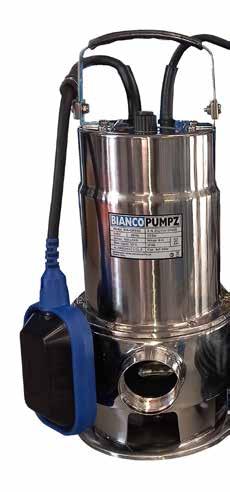


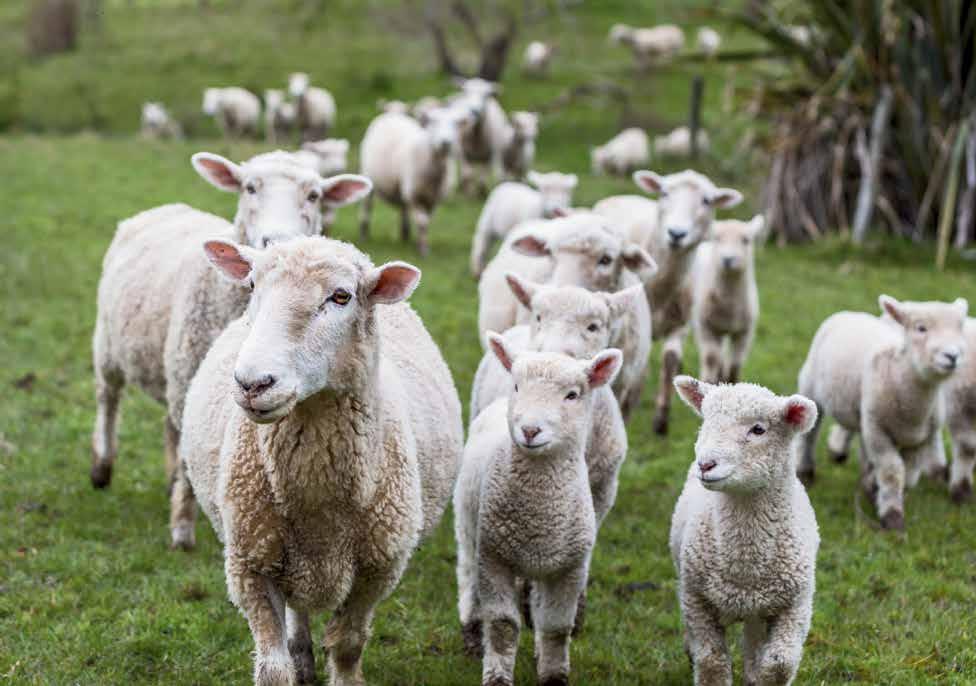

Maungatautari Ecological Island Trust has let half of its mountain rangers go as Department of Conservation funding ends.
Maungatautari Sanctuary Mountain general manager Helen Hughes told The News the trust had lost seven of the 13 mountain rangers the trust employed when she joined the organisation in October 2023.
Their job is to protect the many endangered species living within the world’s largest predator proof enclosure near Cambridge with constant maintenance and monitoring of predator traps.
The 3400-hectare project costs $5000 a day to run and was set up to be joint funded by DOC, Waikato Regional Council and Waipā District Council.
“DOC Jobs 4 Nature funding has dried up, with that we have lost some staff, down to the minimum level, and we have to change the way we do things,” Hughes said.
DOC provided $589,000 worth of Jobs 4 Nature funding over four years.
“We are down to six rangers and a manager,” Hughes said. She took solace in knowing the trust was not the only organisation going through such challenges.
Ranger Warwick Prewer, recently profiled in The News, kept his job after the trust found two months funding from elsewhere. Meanwhile, the trust has raised enough funds to extend operation beyond the end of August until October with plans for collection days at branches of The Warehouse.
“We can see that we have got enough funding to get us there,” Hughes said.
“We have got funding for two months. We seem to be chasing two months. That seems to be what we are doing at the moment.”
Hughes is applying for grants from the Waikato’s philanthropic organisations and the National Lottery as well as having conversations with potential sponsors.
“The DV Bryant Trust confirmed we are getting $20,000, which is wonderful,” she said.
Discussions are also underway with Waikato Regional Council for further funding.
“We are just waiting on others, it’s quite a long process. There’s lots of irons in the fire.”
Hughes is hopeful DOC will continue to support the project after welcoming representatives of the government department to the trust’s August board meeting last week.
“They are going through a strategic review themselves and
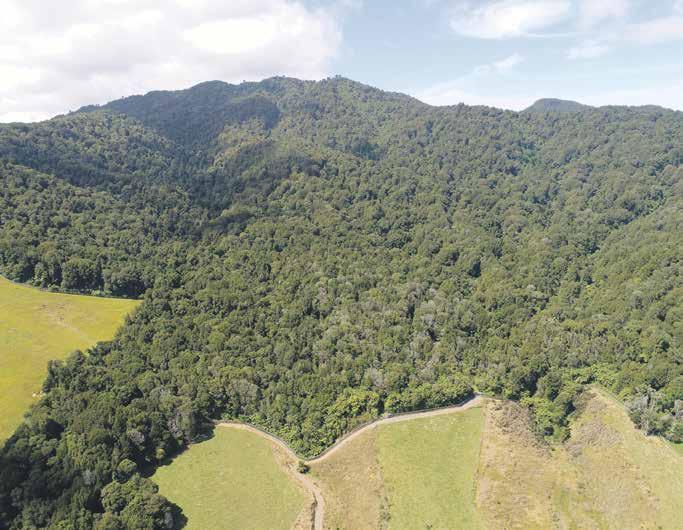
Seven of the thirteen Maungatautari rangers have been let go.
that’s going to take time,” she said. “That’s a challenge for us as well.”
As well as the Jobs 4 Nature funding, DOC has also supported Maungatautari over the last four years with $441,000 worth of threatened species monitoring funding, such as kākāpō and hihi (stitch bird), and $140,000 worth of operating costs funding.




Maungatautari was recognised as a reserve in 1912. The Maungatautari Ecological Island Trust was formed in 2001. Building of the predator proof fence began in 2002 and by 2004 all mammals were eradicated from the two enclosures. A record 20,000 visitors came to Maungatautari in the last year, including 4000 school students.
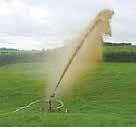
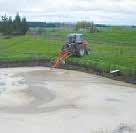


Kate Monahan
Seventeen people from King Country and Waipā, including representatives from police, schools and a youth trust – have completed a Youth Mental Health First Aid (MHFA) Aotearoa workshop.
The two-day training, held in the Te Awamutu Rugby Sports and Recreation Club on August 1 and 8, was run by Mates Matters NZ.
The Youth MHFA Aotearoa programme equips adults with the knowledge, skills and confidence to recognise and respond when a young person is experiencing a mental health challenge or mental health crisis.
“Mental health is huge within our communities and there are a lot of pressures on our youth,” said Constable Kathryn Payne, a school community officer with police who attended the workshop with a colleague. In her role, she supports around 80 schools including those in Waipā and King Country.
“I know that a lot of youth are struggling more and more with mental health, and we need to have strategies around how to best to support them and talk to them about it.”
According to the 2022/23 New Zealand Health Survey, over half of all New Zealanders aged 15 to 24 experience anxiety or depression. The number of young people experiencing moderate to high distress has nearly doubled since 2016/17. Māori, Pacific, disabled and rainbow youth are more vulnerable.
The workshop focused on how adults can understand and support the mental health of intermediate and high school aged children, with a five-step mental health action plan to follow if needed. It covered topics such as anxiety, depression, eating disorders, problematic substance abuse, non-suicidal self-injury, suicidal thoughts and behaviours, panic attacks, traumatic events and psychosis.
A group of kaimahi from Ko Wai Au Trust, a not-for-profit organisation supporting rangatahi, also attended the workshop.
“It was awesome, I loved it,” said Ko Wai Au Trust co-founder and general manager Georgina Christie. “We all took away some good learnings, good validation that we are on the right track, and some good reminders.”
Co-founder Andrew Christie said talking about mental health was important to reducing stigma in the community.
Te Awamutu Intermediate learning support coordinator Karyn Kay said the workshop was “really relevant”, reflecting what many schools are seeing with increased levels of anxiety, along with social, behavioural and learning challenges among students.
Her highlights included learning about some of the more complex mental health challenges,
Fonterra elections

alongside some practical tools for supporting young people.
“I enjoyed learning strategies of what I can say to children when they come to me and are upset, to help them manage their anxiety.”
Constable Payne said the workshop was “engaging” and reinforced what she knew but also gave her more confidence in her conversations with a robust plan to follow.
“They also taught us that you’re not the mental health expert, but as a Youth Mental Health First Aider, you are there to support them.”
Workshop co-facilitator Sarah Christensen, who is also the programme manager for Mental Health First Aid Aotearoa, said it was fantastic to see so many people come together to support youth.
“Everyone on the course has a huge passion and heart for the young people they work with, and we hope this training will make a difference in the lives of young people in the community.”
As Mental Health First Aiders, they join more than 7500 adults across the country who have been trained in one of the MHFA Aotearoa programmes. The evidence-based programme is licensed by Te Pou in New Zealand and has been adapted from an internationally recognised programme taught in 29 countries.
Christensen hoped the programme would continue to grow, with the aim of training more Youth MHFA Aotearoa instructors nationwide who can deliver the programme in schools, sports clubs and communities.
“As adults, we all have a role to play to
support young people with mental health challenges. Recognising the signs and having a conversation can save lives.”
Christensen and co-facilitator Sarah Keelty from Health New Zealand Te Whatu Ora Waikato have decades of experience working in the mental health and addictions sector, something valued by workshop participants.
“When you asked a specific question, they could answer it with practical advice because they’ve been in those situations,” said Andrew Christie.
Christensen applauded those who completed the Youth MHFA Aotearoa course.
Georgina Christie said one of the highlights of the workshop was collaborating and building stronger relationship with others working with young people in the region.
“At the end of the day, we not only want to be able to support the rangatahi and whānau we work with, but we all want to make a better and stronger community.”

• Quality, professional advice to farmers and businesses
• Expert taxation and business structure planning
• Family trust management
• Friendly, personalised service Contact us for a FREE NO OBLIGATION INTERVIEW to discuss your financial requirements

The Employment Relations Act allows an employee to raise a personal grievance, but it doesn’t specify what the personal grievance must look like. The personal grievance process is designed to be informal and accessible. The Courts have developed key principles to use when deciding if communications or a series of communications can be seen as a personal grievance. These include:
• a personal grievance may be raised orally or in writing;
• the employee doesn’t have to use any specific words;
• where there have been a number of communications between the employee and employer, each communication will be examined, as well as considering all communications as a whole;
• it doesn’t matter what an employee intended their complaint to be or their process of dealing with it;
• it also doesn’t matter if the employer recognised the complaint as a personal grievance;
• the communication must give sufficient information on the grounds on which the employee is basing their grievance to allow the employer to know what they are responding to.
Nominations for the Fonterra Board of Directors open tomorrow for an election of two farmer-elected directors. Leonie Guiney, Peter McBride and John Nicholls retire by rotation and McBride and Nicholls will seek re-election.
Gore blimey
Gore farmers are unhappy with local district council plans to declare their entire district a Site and Area of Significance to Māori and there are concerns it could have national implications. “This is a highly unusual approach to handling iwi interests and could have a chilling effect on ordinary farming activities," provincial Federated Farmers president Jason Herrick says.

While these principles are useful, we suggest that an employee raises their personal grievance in writing to their employer to avoid having to waste time and money to determine if a grievance has been raised. Your solicitor will be able to help you prepare your personal grievance and advise you on the process going forward.

























































Views, space, location, sunshine and potential are usually the top contenders on anyone’s wish list and this home delivers the lot.
Situated near the end of a cul-dec-sac on a quiet street, this attractive home can’t be built out and offers a glorious rural view straight through to Mt Pirongia.
Originally built for a busy family, this house has been very well preserved and features three bedrooms on the main floor with two bathrooms, a large lounge with wood-burner, heat pump and a sunny north facing balcony.
Downstairs has the advantage of a large rumpus room or fourth bedroom, as well as a study/storage



room plus a large laundry with a third toilet is a great advantage.
There are plenty of options for an extended family set-up with the additional space as well as a double garage, with internal access.
A 1895m2 section has an abundance of fruit trees and room for plenty more, as well as a decent sized vege patch for those wishing to grown their own produce.
Our vendor is looking to downsize after nearly 30 years of enjoyment here. Get ready for summer in your new home - stake your claim today!
OPEN HOME: Saturday, August 17 - 2pm-2.30pm
Location is Key
LOCATION |14 Long View Cres, Ōtorohanga
LAND I 1895m2
HOUSE | 3 bedrooms, 2 bathrooms, 3 toilets, 2 lounges and 2 garages
PRICE | $670,000
LICENSED AGENT | Harcourts Ōtorohanga
LICENSED SALESPERSON | Karen Lennox 027 559 4468 Kerry Harty 027 294 6215
WEBSITE | blueribbonharcourts.co.nz
WEB ID | OH22482
Welcome to 29 Ailsa Street Te Kuiti! This charming three bedroom, one bathroom brick home situated on a large section, 1950sqm more or less, is the perfect starter for the keen handyman.
The open plan kitchen/dining/living area of 80 sqm provides a comfortable living, and with the upgraded double glazed aluminium joinery and heat pump, you will be cozy and snug. Amenities like the hospital and the college are in walking distance.
Don't miss out on this opportunity to own a home in Te Kuiti.
Priced at $385,000, this property won't last long. Contact Antonia today to schedule a viewing and make this house your new home!
For Sale $385,000 View Open Home: Sun 18 Aug, 1.00 -1.30pm blueribbonharcourts.co.nz/property/OH22483

Antonia Jongmans
M 027 656 1506
E antonia.jongmans@harcourts.co.nz







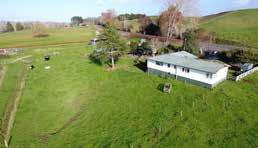









































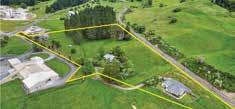











































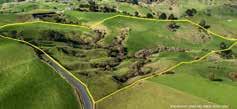








2104sqm, no covenants on
16 Merrin Avenue, Otorohanga, 1459sqm, no covenants on
163 Old Te Kuiti Road, Lots 1, 3 & 4, 5517-8932sqm, easy covenants. Phone Lorraine From $250,000ea Lot 1, 627 Waitomo Valley Road, Otorohanga, 8105sqm rural lifestyle section. Phone Julie $370,000 Lots 90-108 Harpers Avenue, 486sqm to 962sqm, Westridge II subdivision. Phone John From
Te Kūiti sections (sizes are approximate)
54A Ailsa Street (Lot 1), Te Kuiti, 2159sqm, end of a cul de sac, STT. Phone Buzz
54A Ailsa Street (Lot 2), Te Kuiti, 1707sqm, end of a cul de
10 Robin Azariah Place, Te Kuiti, 600sqm level section. Phone Buzz
Other sections (sizes are approximate)
0 Raglan Road, Kawhia, 2648sqm lifestyle section, no covenants,
147 Maukutea Drive, Kawhia, 600sqm, covenants apply, services at drive,

















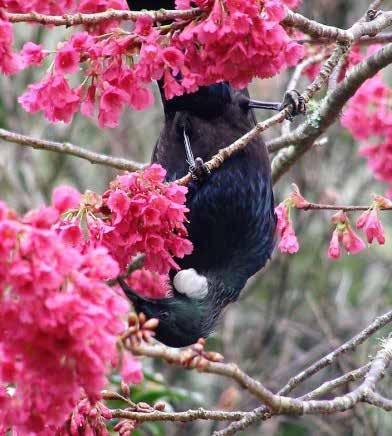


Katrina Christison Tidy Gardens
As I drive around at the moment, I can’t help but notice the stunning flower display of the Prunus starting to flower. One of my favorites is the Prunus campanulate ‘Fleix Jury’.
This is a stunning cultivar commonly known as the Tui tree or Taiwan cherry.
It is a stunning deciduous tree that brings vibrant color and life to any garden.
Native to Taiwan, this tree is highly valued in New Zealand for its early spring blossoms, which are a vivid, deep pink.
The bell-shaped flowers are not only visually striking, but also attract native birds, particularly the Tui, hence its common name.
The Tui tree blooms in late winter to early spring, providing a muchneeded splash of color when most other plants are still dormant.
It’s flowers are rich in nectar, making it a magnet for birds like Tui and bellbirds, who feast on the blossoms and bring their beautiful songs to your garden.
As the flowers fade, the tree produces small, dark fruits that continue to attract birds throughout the season.
One added bonus about the cultivar Flex Jury is that it is sterile, so while the birds feast on the berries they will not spread this one into our native bush.
‘Felix Jury’ is a small to mediumsized tree, typically reaching around 3-5 meters in height, making it suitable for various garden sizes.
It thrives in well-drained soil and prefers a sunny position, though it can tolerate light shade.
The tree’s attractive form, with its arching branches covered in clusters of pink flowers, makes it a standout feature in any landscape.
In addition to its ornamental value, ‘Felix Jury’ is relatively easy to care for, requiring minimal pruning and being reasonably resistant to pests and diseases.
Its early bloom time and striking appearance make it a cherished addition to gardens.
Bringing both beauty and the joyful presence of native birds to your outdoor space.
Whether you’re looking to add a splash of color to your landscape or create a bird-friendly environment, the Tui tree is a fantastic choice, offering both aesthetic appeal and ecological benefits.














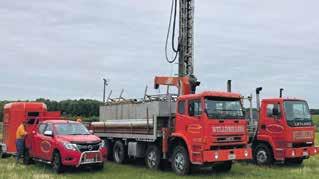







Runoff/Grazing
Block SH3 Kio Kio 18.92 ha (46.6 acres) 13 paddocks permanently fenced for young stock, electricity to all. Bore water with dosatron system. Cattle yards on concrete for 60 head. Calf rearing facilities. All flat with fertile summer safe soil. Central race.
Interested?
Are you a Jack of all Trades looking for a fulltime position??
Come and join our awesome team here at Waikato tractors in our Ōtorohanga branch!
Role will include:
• General yard work
• Assist in assembly of tractors and machinery
• Grooming tractors
• Assisting mechanics
• Steam cleaning
• Sweep floors
• Forklift licence will be helpful but not necessary

We are recruiting now! Would you like to work for us? We'd love to hear from you. We are currently recruiting for the upcoming 2024/25 summer season for guides, conductors, drivers and maintenance staff. If you're passionate about the Ruapehu region and want to enjoy working outdoors in a positive industry get in touch with us today. CV and cover letter to: careers@fwa.co.nz
Hiace, Hilux, Corolla, Landcruiser, Liteace, Townace, Trucks, Nizzan vans & utes.
From $200 to $5000
Same day pick up Ph 0800 551 7004
Dave Kilbride Bayleys 027 436 7082 Owner 07 873 1507 SPLIT FIREWOOD new season’s, shed stored, 3 cubic metres, $350 delivered Tkt/Oto area. Fresh sawdust $5 bag. P 027 584 4505 or 07 894 5872. FOR SALE - 10 purple/red flax plants in pots. Grows up to 2 meters. $6 each. Ph 07 873 1611.



Call into our King St East, Te Kūiti office today to view them and place your order!


• Mechanical knowledge would be an advantage
A perfect way to get some experience in the industry and see what we’re about.
Starting ASAP
If this sounds like a bit of you send gary an email at gary@waikatotractors.co.nz and he will be in contact!
Email your classified ads to reception@kingcountrynews.co.nz
Don’t forget to include your billing details, name, address & daytime contact phone number



Application forms for individuals and organization’s may be printed off the Piopio website or buy emailing the Trust. Email: piopiotrust@gmail.com
Areas covered for grants include Piopio township and the districts of Mairoa – Mangaotaki – Mahoenui – Aria – Mokauiti – Mapiu – Kopaki –Benneydale – Oparure and Rangitoto. Te Kūiti Borough is not included.
Applications close at 5pm on August 31. Late applications will not be accepted.

Are you passionate about livestock management and ready to take the next step in your career? Taumatamoana Station (TMS) is seeking a dynamic and experienced livestock manager to join our team!
About the role:
• Position: Livestock Manager
• Location: Beautiful coastal property in the Waitomo District (Taharoa)
• Farm Size: 3400 HA sheep and beef property
• Livestock: High-performance Romney flock and approximately 850 Cow Angus herd with excellent genetics
Responsibilities:
• Hands-on role working closely with the station manager
• Involved in breeding and stock performance direction
• Assist managing a team of 3 staff and a support shepherd
What we offer:
• Competitive salary package
• 4-bedroom house provided
• Opportunity to work on medium to steep hill country with a scenic coastal backdrop
Requirements:
• Proven experience in livestock management
• Strong leadership skills
• Ability to work collaboratively and independently
• Passion for animal breeding and genetics
If you’re looking for a challenging and rewarding role in a stunning location, we’d love to hear from you! Apply now and be part of a high-performing team dedicated to excellence in livestock management.
How to apply: Submit your application, including a resume and cover letter, to j.mcoviney@steelfort.co.nz by Friday, August 8. Please phone John for more information 027 442 3921. Join us at Taumatamoana Station and help shape the future of our high-performance livestock!

Te Nehenehenui is inviting
-
-
-
-
This is a friendly reminder that the first instalment of your 2024/2025 rates is due by 5pm, Friday 30 August 2024. Rates invoices were posted out in July. Payments received after 5pm, 30 August will attract a 10% penalty.
Rates payments can be made at the Customer Service Centre, 160 Rora Street Te Kūiti, over the phone by credit card, on our website or by Internet Banking using your valuation number as your reference.
Please contact our friendly Customer Services Team on 0800 932 4357 for further assistance.
Ben Smit Chief Executive
ARUKA MARAE COMMITTEE ANNUAL GENERAL MEETING 2024
Sunday, September 8, 2024 10.30am @ Aruka Marae, Tahaaroa Nau mai Haere mai, kanohi ki te kanohi No zoom available
Agenda: Karakia
Apologies
Chairman’s report
Financial report
Nominations of new committee members (Nominees must be present, nominations received from the floor)
LUNCH
-
-
-
-
Karakia, Tikanga ā-Whare, Apologies, Minutes from previous hui
2023/24 Te Nehenehenui Annual Report 31st of March 2024
Chairs Address
Te Nehenehenui Chair’s report Waihikurangi Trust Chair’s report
Ahuahu Group Limited Chair’s report Group CE report
Te Nehenehenui Financial Statements
Pātai Resolutions
Te Nehenehenui Operational report
Pātai
01.00pmPōwhiri Morning Tea
Te Kawau Rukuroa
Kai o te rānui
For those unable to attend in-person, there will be a livestream on our Facebook page.
10am, Saturday 14 September 2024
Mana Ariki marae, Ongarue Back Road, Taumarunui
Maniapoto pākihi!
We’re excited to be inviting our Maniapoto business owners to submit their expressions of interest to hold a stall at Hui ā-Tau 2024!
From kai to kakahu, we’re looking for Maniapoto pakihi owners to come and set up shop during Hui ā-Tau.
If you are interested in this business opportunity, scan the QR code or head to our website

A1 Administration Solutions is located in Te Kūiti township and provides efficient and effective administration services to existing and prospective clients.
We are seeking a part-time Administration Assistant (20-30 hours per week), fixed-term (1 year with the possibility of continued employment) The successful candidate will report to the senior manager and your part in the ongoing success of this entity will see you involved day to day in a variety of duties as follows (but not limited to):
• Answer phone calls and reception duties
• Collect & collate all inward & outward correspondence
• Meeting minutes
• Photocopy, scan, file and bind as required
• Assist with large mailouts
• Order stationery & other items as required
• Book accommodation
• Manage board room bookings
• Organise & order catering requirements
• Keep our office & boardroom clean & tidy
• General office duties
• Support other administration staff as required
This role is suitable for someone with the following skills:
• Pleasant demeanour
• A quick learner with a can-do attitude
• Reliable, dependable, and willing to “Pitch In” at all times
• Organised with strong attention to detail & accuracy
• Good computer skills in Microsoft Office programs
• Excellent communication skills
• High degree of confidentiality
• Ability to work co-operatively with a wide variety of people
• Able to meet deadlines
Training will be given to the successful candidate; however, previous experience would be an advantage.

www.waitomo.govt.nz

ADVERTISEMENT OF RATING SALE
In the High Court of New Zealand
Hamilton Registry
ROHE NO. CIV-2016-419-199
In the matter of the Local Government (Rating) Act 2002
Between Waitomo District Council
Local Authority
And: Josephine Taku-Aroha Panapa, Lorraine Raiha Rakei, Nan Tamaiwhaho
Alice Hanna Turner, The Owners
Sale of freehold property under Local Government (Rating) Act 2002; property situated at 21 Georgetti Street, Benneydale
At the request of the Waitomo District Council in the exercise of a power of sale under the provisions of the Local Government (Rating) Act 2002 for the non-payment of rates, the Registrar of the High Court at Hamilton (the Vendor) offers for sale by tender the freehold property situated at 21 Georgetti Street, Benneydale, being described as Section 106 Block X Mapara Survey District being the land comprised in Certificate of Title TNJ2/1052.
21 Georgetti Street, Maniaiti / Benneydale, Te Kuiti is a Residential property built in 1942 with 2 bedrooms, 1 bathroom and 1 parking space.
Tenders close at 5:00pm on Friday, 27 September 2024 and are to be submitted to Tauranga High Court, McLean House, 26 McLean Street, Tauranga or posted to The Registrar, High Court, DX HX11034, Tauranga.
Please note that a reserve price may apply.
Particulars and Conditions of Sale
Particulars and conditions of sale may be obtained from the office of the Registrar of the High Court at Tauranga where the contact is stephen hewlett@justice.govt. nz at any time during office hours, or from Debt Management Central, DX PA84005, Feilding or email dmc@mw.org.nz
Dated at Tauranga this 30th day of July 2024
Stephen Hewlett Registrar / Deputy Registrar High Court of New Zealand
Previous minutes
Matters arising
General business
Karakia whakamutunga
Notice of Special Annual General Meeting 2024 Mirumiru Paa ki Marokopa
Saturday, September 7, 2024 –Mirumiru Paa Ki Marokopa 10am Meeting Starts
Agenda
1. Karakia/Mihi
2. Apologies
3. Trustee Election - 1 trustee position
4. Nominated Trustee korero
5. Piruru update
6. Karakia whakamutunga
Call for Nominations
Position: 1 x Trustee
Open: August 14, 2024
Close: September 2, 2024
Nominations for a trustee can be made in writing to the secretary or nominated from the floor at the Special Annual General Meeting.
All written nominations must be received by email September 2, 2024.
Written Nominees are to supply to the secretary
1. Their written nomination.
2. Brief biography.
3. Signed Declaration of Commitment to the aims and philosophies of the Marae. This form can be assigned and completed at the AGM or emailed. 4. All nominations must be seconded.
Note: For the Declarations of Commitment form and the Current Charter email on below email address
Email all required documents by September 2, 2024 to the below address (for written nominations)
Shannon Martin Mirumiru Paa ki Marokopa Secretary kiaora@mirumirupa.org




111 Non emergency police...................................Dial 105
Te Kūiti......................................................07 878 1450
Ōtorohanga..............................................07 873 7399
Piopio.......................................................07 877 0490 Benneydale..............................................07 878 1370
Ōtorohanga..............................................07 873 8399
Te Kūiti......................................................07 878 7878
For all urgent out of hours call.................07 878 7878
Unichem Te Kūiti Pharmacy
Sat 9.30am - 12.30pm..............................07 878 8011
Unichem Ōtorohanga Pharmacy
Sat 9am - 12.30pm..................................07 873 7294
Citizens Advice Bureau -Ōtorohanga, Te Kūiti and Taumarunui (free legal advice)...............................0800 367 222/07 878 7636 Community Mental Health Service..........07 878 8767
505 050 Counselling Services North King Country Mon - Fri, 9am - 3pm................................07 873 7676 Waitomo Women’s Refuge Helpline........07 878 5081
0800 733 843
Te Kūiti Hospital.......................................07 878 7333 Cancer Society supportive care nurse...0800 227 744 Te Kūiti Community House ......................07 878 5272
NKC Family Support Mon - Fri, 9am - 3pm...............................07 873 6502
Control
Funeral Services


96 Rora Street, Te Kūiti 07 878 8882 or 027 567 1930 bloomsandbrewsnz@gmail.com
Call into our King St East, Te Kuiti office today to view them and place your order!

Flexman, Christine Jane (nee Moys):
One year today, aged 41 years. Our Chrissie
Your life was a blessing, your memory a treasure
You are loved beyond words and missed beyond measure. If tears could build a stairway and memories a lane
We’d walk right up to Heaven and bring you home again.
In our hearts always, Your girls xx
FALCONER, Thomas (Tom): Passed away with family by his side, just as he wanted, on 6 August 2024 aged 82 years. A devoted husband to Sue for over 55 years.

Oakley, Gillian: Passed away eleven years ago on August 16, 2013.
A loving father to Jenni, Maire and Tim. Fatherin-law to Andrew and Elina. Proud grandfather to Jordan, Steven, Meg, Ella and Livia. A special thanks to Dr. Simon Hornby of Hamilton East Medical Centre, the team at Hospice Waikato, and the staff at Bupa St Andrew’s for their attention and care over the past few months.






Availability of the 2024 Chairperson s Annual Report, Financial Statements, 2024-25 Annual Plan, and Waipa Networks Ltd Statement of Corporate Intent.
I hereby give notice that on Friday the 23rd of August 2024, commencing at 10.00am, a Public Annual Meeting of Beneficiaries (Connected Consumers) will be held at Waipa Networks, 240 Harrison Drive, Te Awamutu.

At the meeting the Trustees will report on:
· The operation of Waipa Networks Trust for the year ended 31 March 2024.
· The Financial Statements of Waipa Networks Trust for the year ended 31 March 2024.
· The performance of Waipa Networks Limited for the year ended 31 March 2024.
· The compliance of Waipa Networks Limited with its Statement of Corporate Intent for the year ended 31 March 2024.
· The Annual Plan 2024/25 of Waipa Networks Trust.
At the meeting the Beneficiaries will be given the opportunity to:
· Appoint the Auditor for Waipa Networks Trust for the 2025 financial year.
· Speak on all matters being considered at the Annual Meeting.
Please note that the above named documents are available for public inspection on the Trust website or at the offices of Waipa Networks Limited at 240 Harrison Drive, Te Awamutu during ordinary business hours.
KM Heeringa Trust Manager
Have something you need to photocopy?
We offer a wide range of photocopy and printing services at very competitive prices –in fact we are the cheapest in town! Bring your own paper or choose from our wide range of speciality paper and card. Call in and see us now at 18 King St East, Te Kuiti
Piopio contact: 07 877 8097 Mōkau contact: Mrs Dorothy Lowry 06 752 9123 Church Notices
Dearly loved and treasured daughter of Elsie and Tony, cherished sister of Sharon and Roger, Alison and Shanon, Andrew and Shelley, and adored Aunty of Kristen, Aimee, Shaun, and Jacob, special great aunty of Marnie, Dash and Navy.
Eleven years of missing you Gill, memories are treasured, you are constantly in our thoughts and forever in our hearts. SAGA 4ever.
Phillips, Carol Francis: In loving memory of our dearly loved youngest sister. One year without you has been so hard but your life was a blessing. Your memory a treasure.

You are loved beyond words and missed beyond measure. Your loving family, Myrtle, Winsome, Connie, Nola and Bruce.
ROBERTS, Muriel Mary: Peacefully at Radius Windsor Court Rest Home, Ohaupo, on Saturday, August 10, 2024, in her 98th year. Dearly loved wife of the late Bruce. Cherished and much loved mother and mother-in-law of Gaylene and Donald Millin; Hugh and Barbara; Ross and Vivienne;Helen and Murray Brandon. Adored Grandma of twelve grandchildren, great grandma and great great grandma of many. Dearly loved youngest daughter of Hugh and Nellie McDonald. Loving sister of Beth, Ivy and Helen (all deceased). Born in the Mangapurua Valley (via Wanganui River). Mum always loved the wide open spaces, the native bush, the trees and flowers. People and animals were very important to her as well.
A celebration of Muriel’s life will be held at St David’s Presbyterian Church, Ōtorohanga on Friday 16th August at 11am, followed by interment at the Ōtorohanga Cemetery. All communications to Roberts Family C/- PO Box 241, Te Kūiti 3941. In the care of VJ Williams & Sons, Funeral Directors Association of NZ





An Assemblies of God church
10:30am Sunday
We welcome you to our 10.30am Sunday service.
10 Sheridan St, Te Kuiti
Pastor Terry & Rowena Bradley 07 878 8694
If you are unable to attend, please email officejourneynz@gmail.com for the video recording Grace, peace and strength 10 Sheridan St, Te Kūiti
021 703 008
An Assemblies of God Church
TATA, Karen Jill: Peacefully at Te Kūiti Hospital on Wednesday, August 14, 2024, surrounded by her loving family. Loved wife of Jim. Adored mother and mother-in-law of John and Hayley; Rachael and Hamish; Mike and Ashley; Sarah and Malcolm; Polly and Callum. Cherished Nanny of all her grandchildren. A celebration of Karen’s life will be held at VJ Williams and Sons Chapel on Saturday, August 17 at 11am followed by interment at Te Kūiti Cemetery. All communications to Tata Family C/- PO Box 241, Te Kuiti 3941. VJ Williams & Sons, Funeral Directors Association of NZ

















